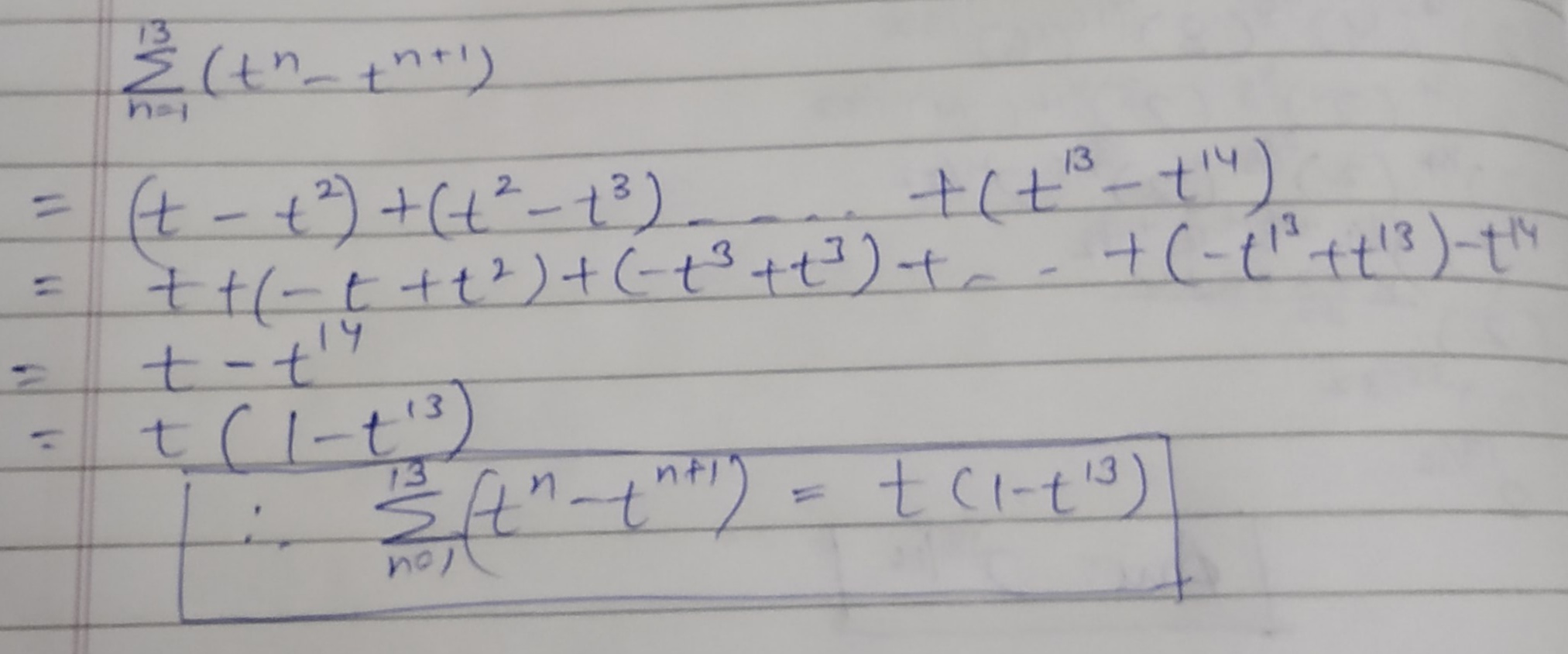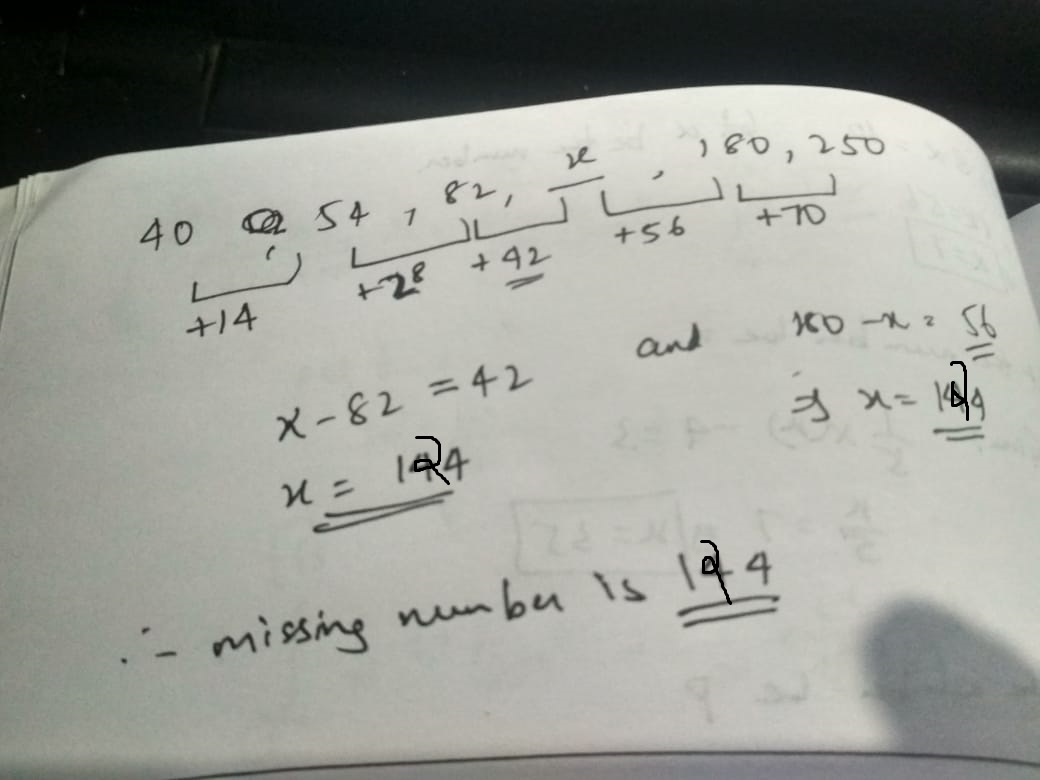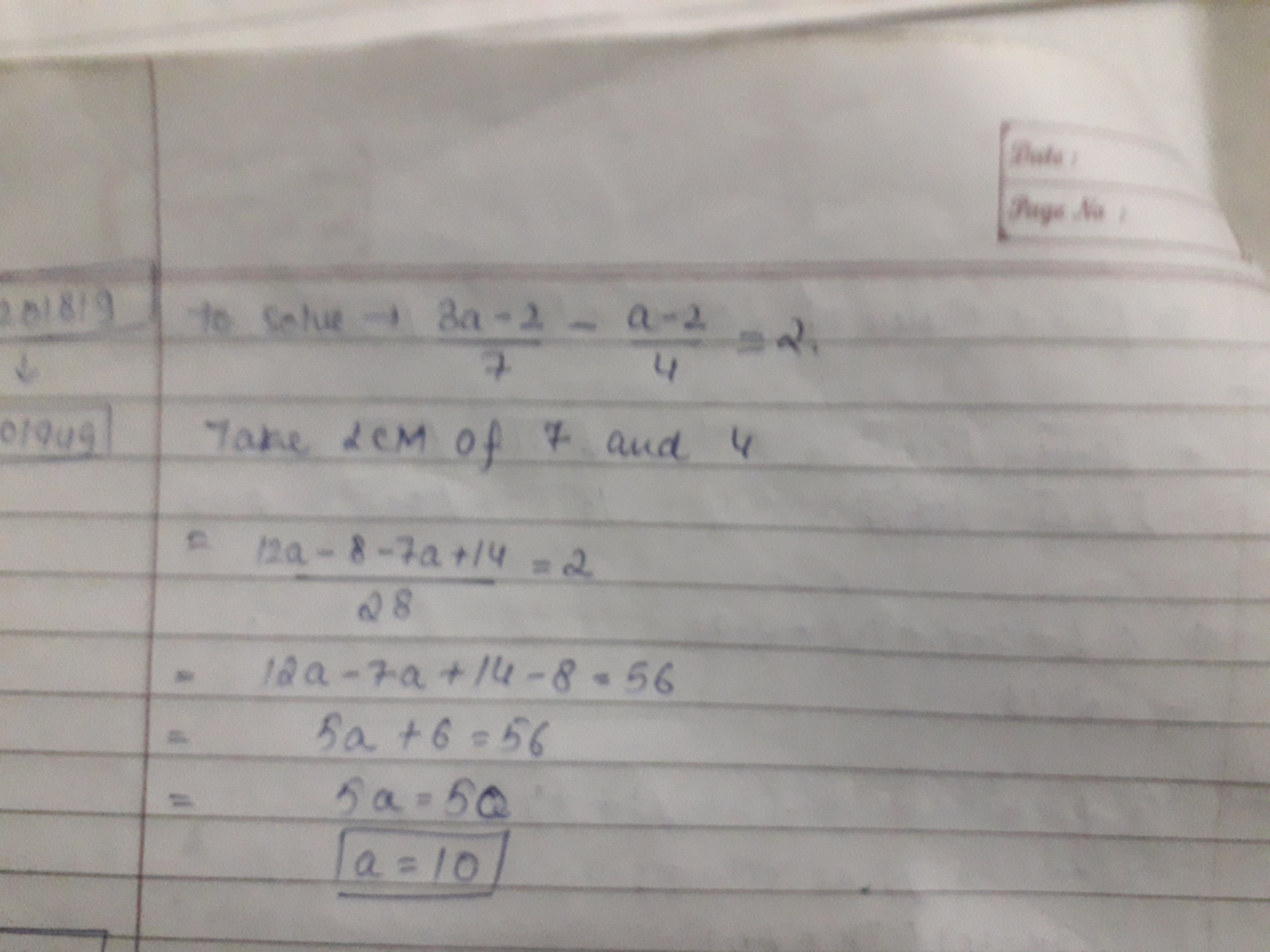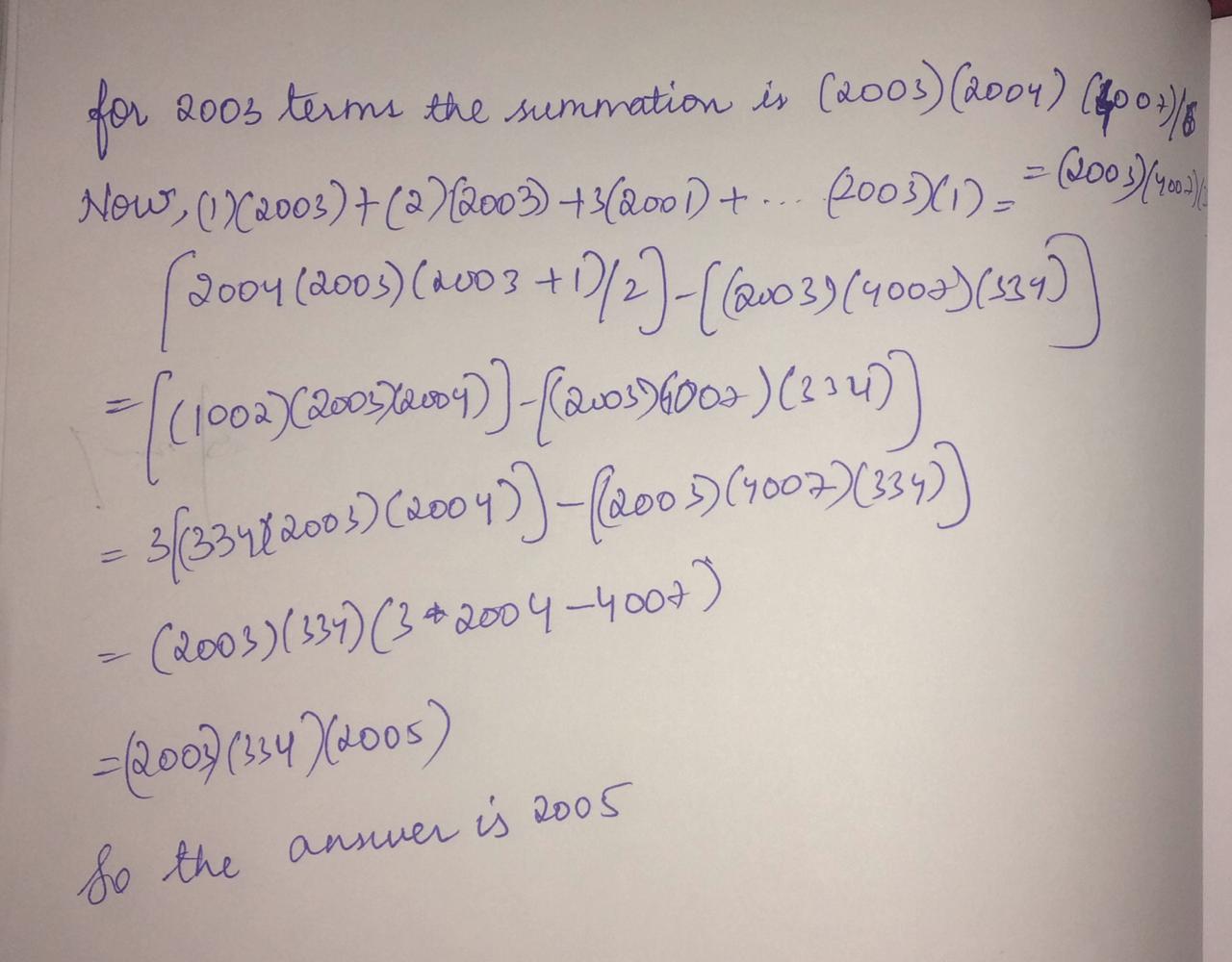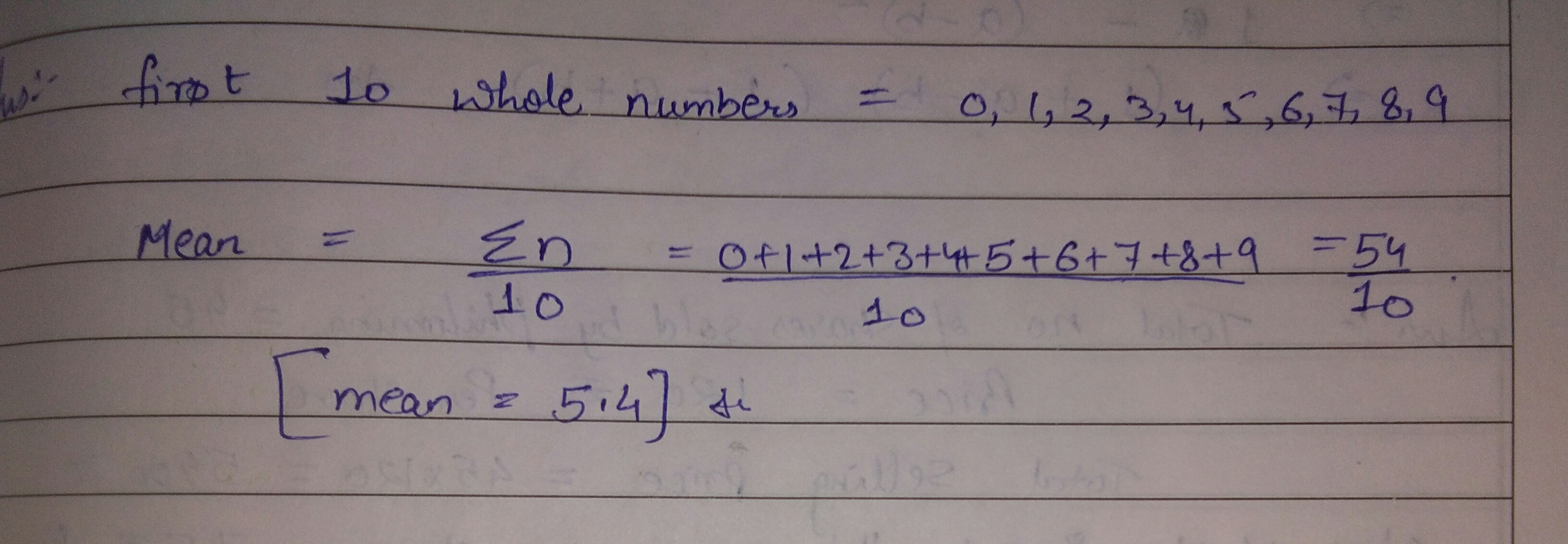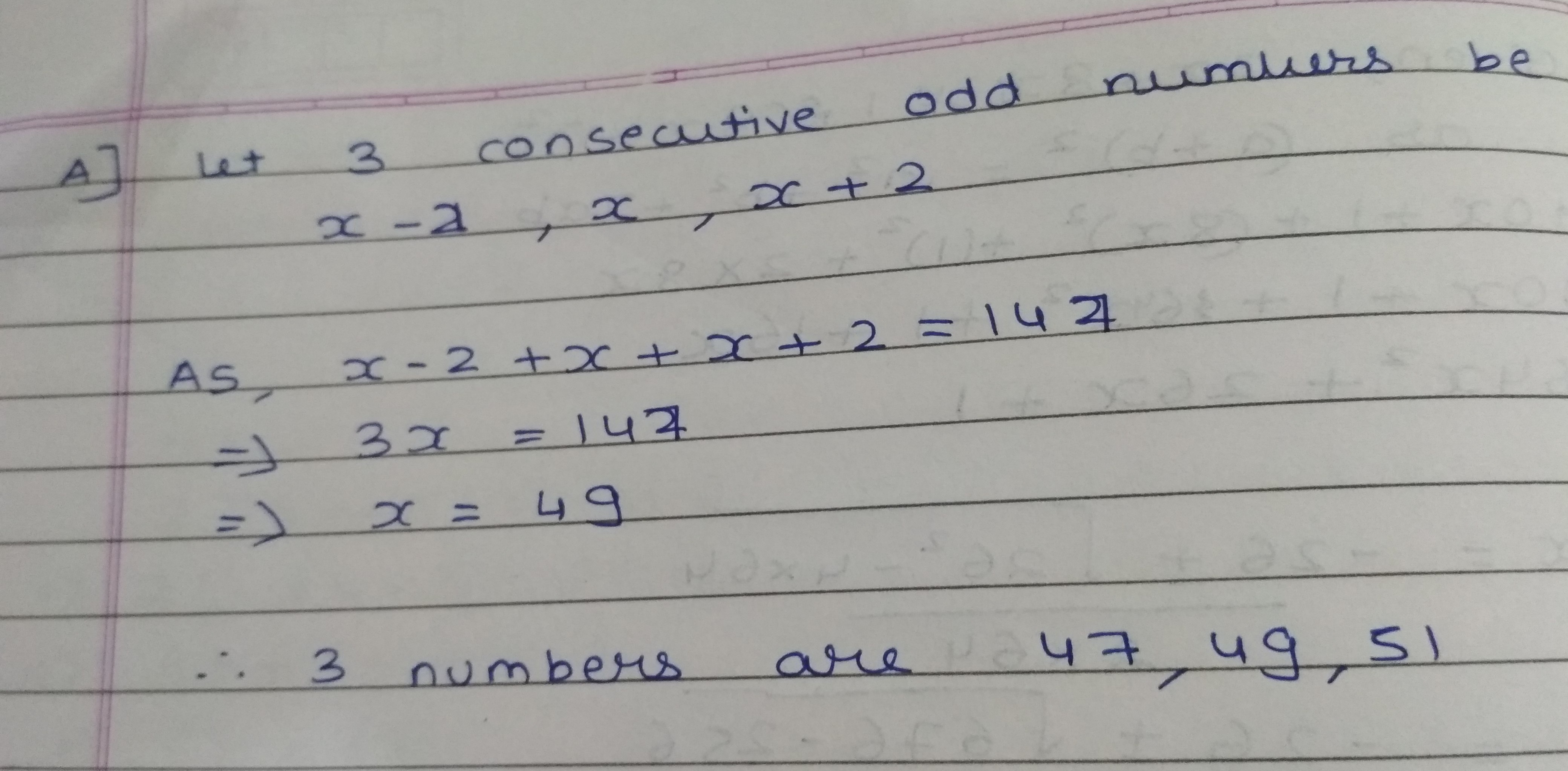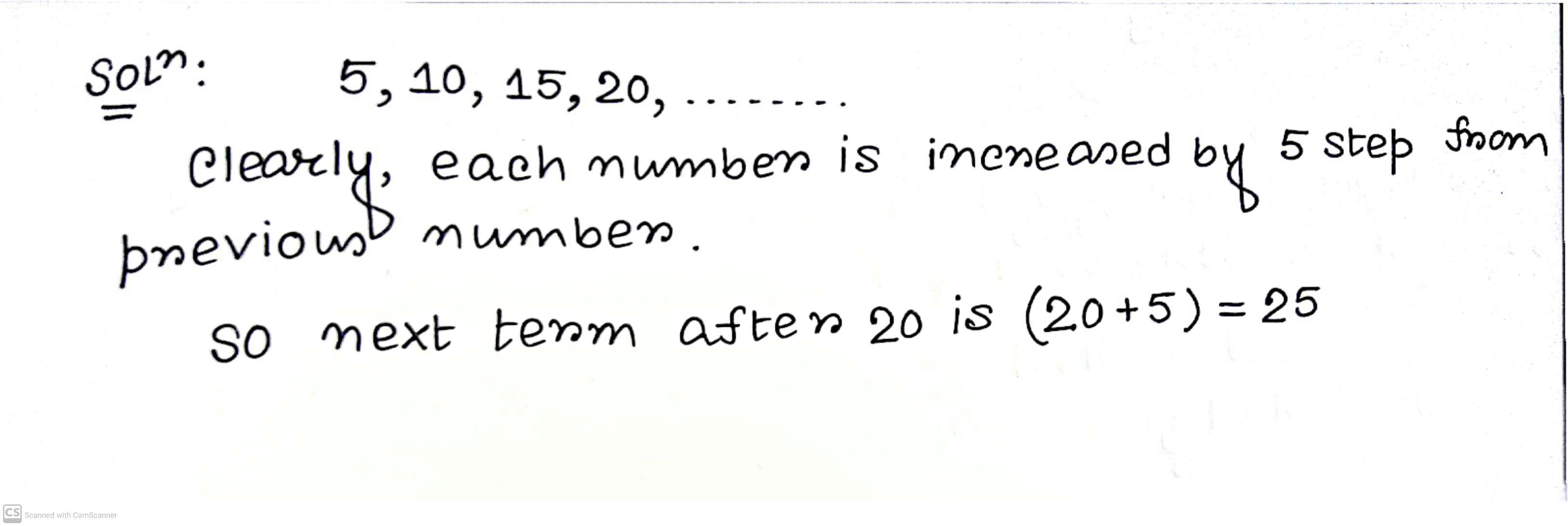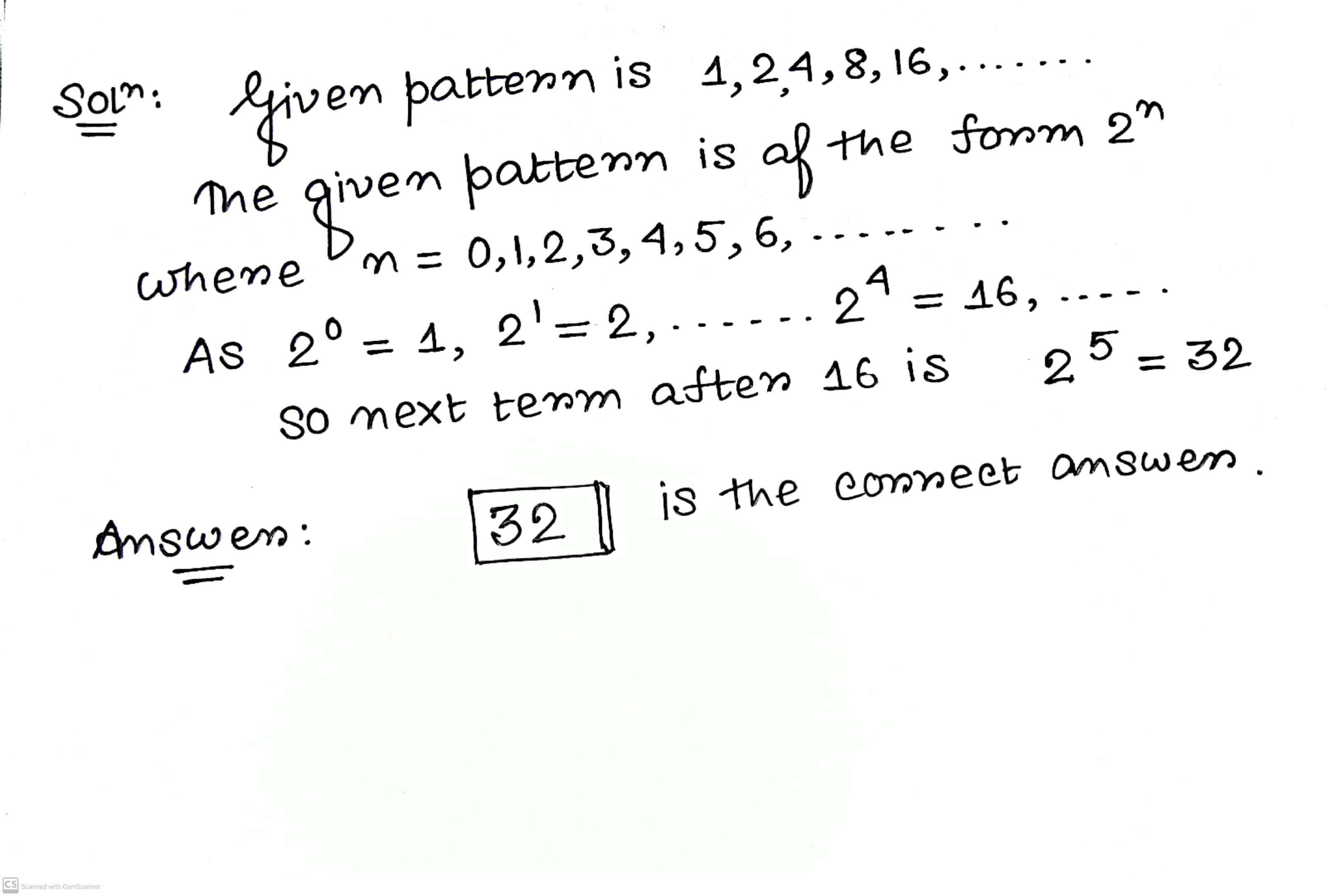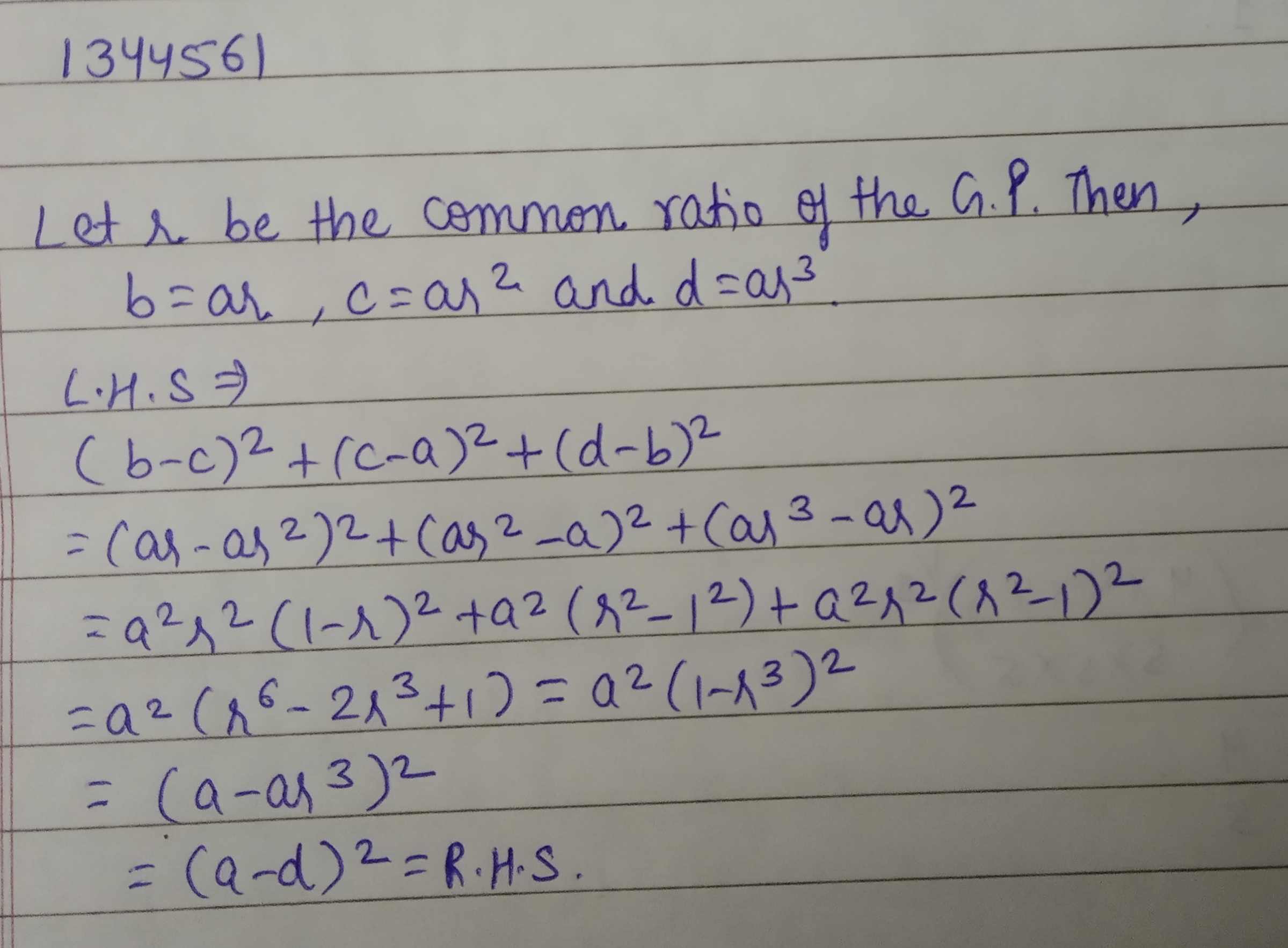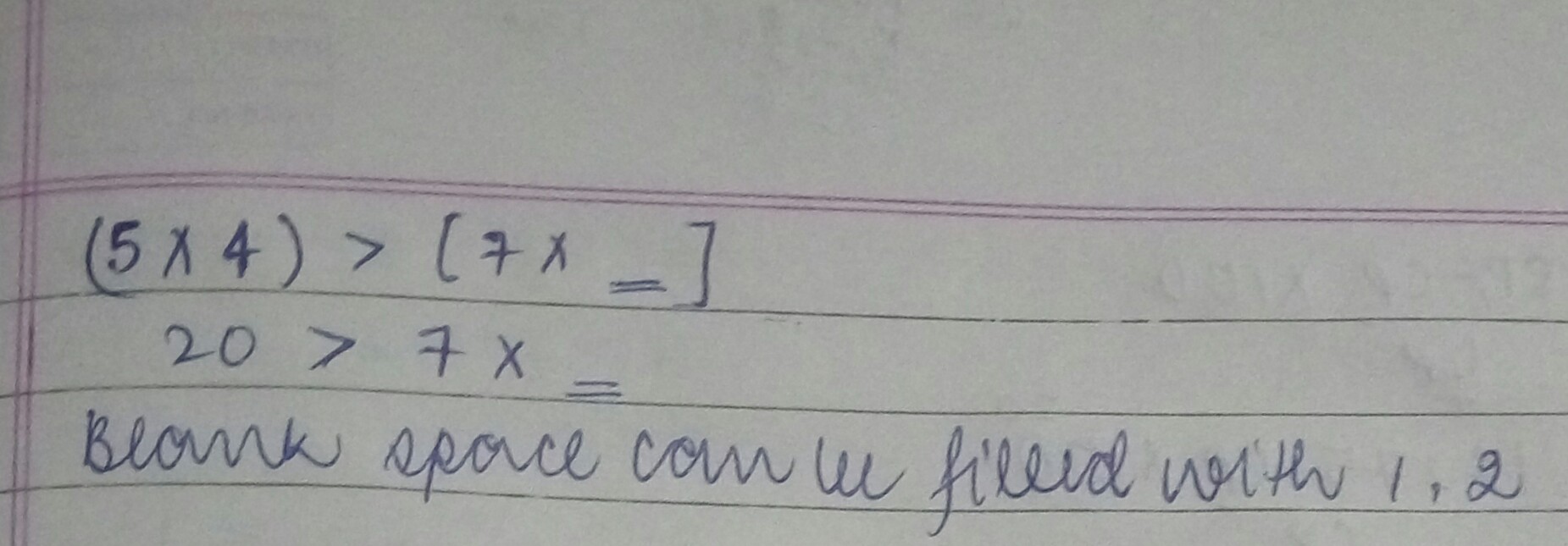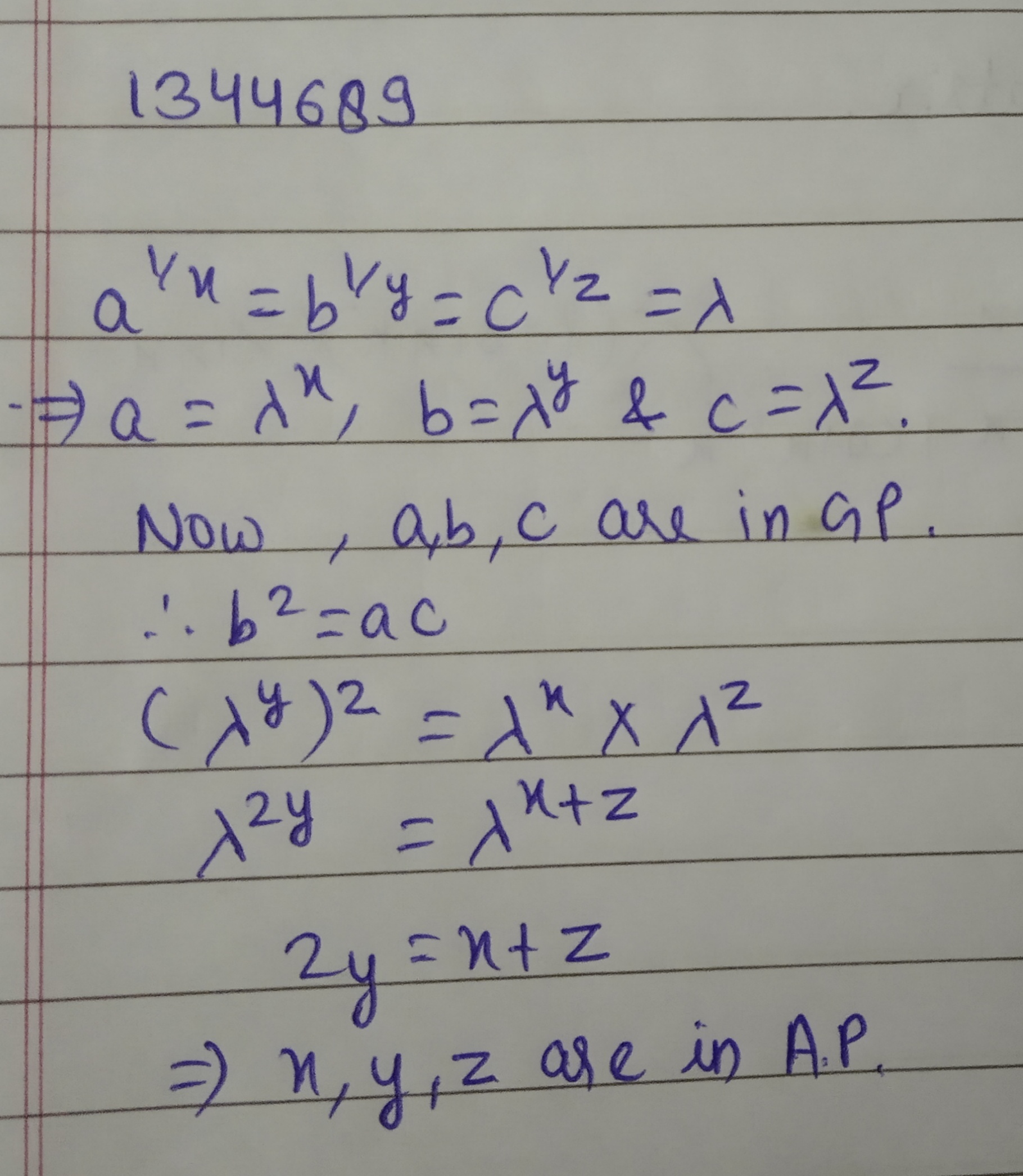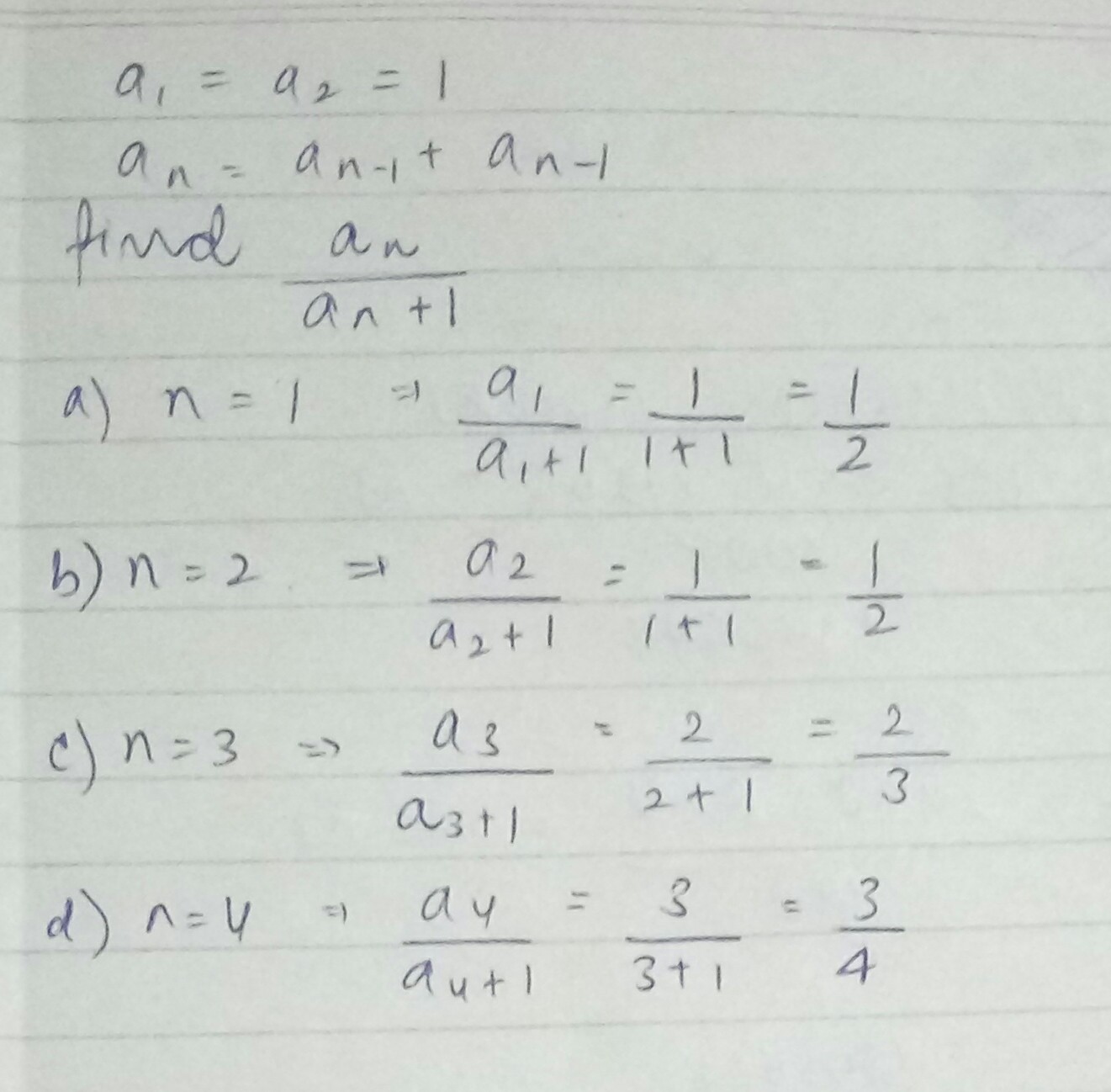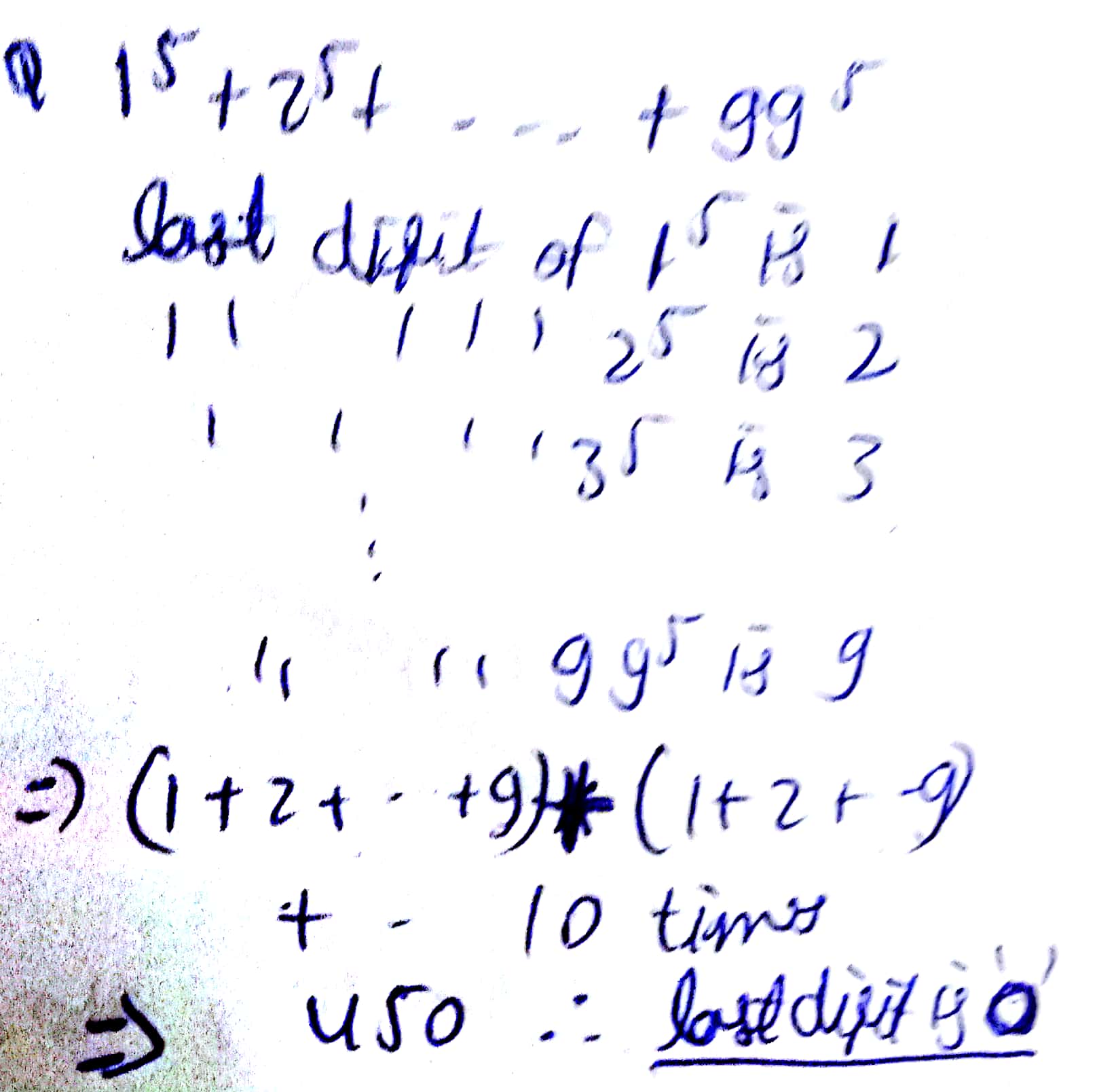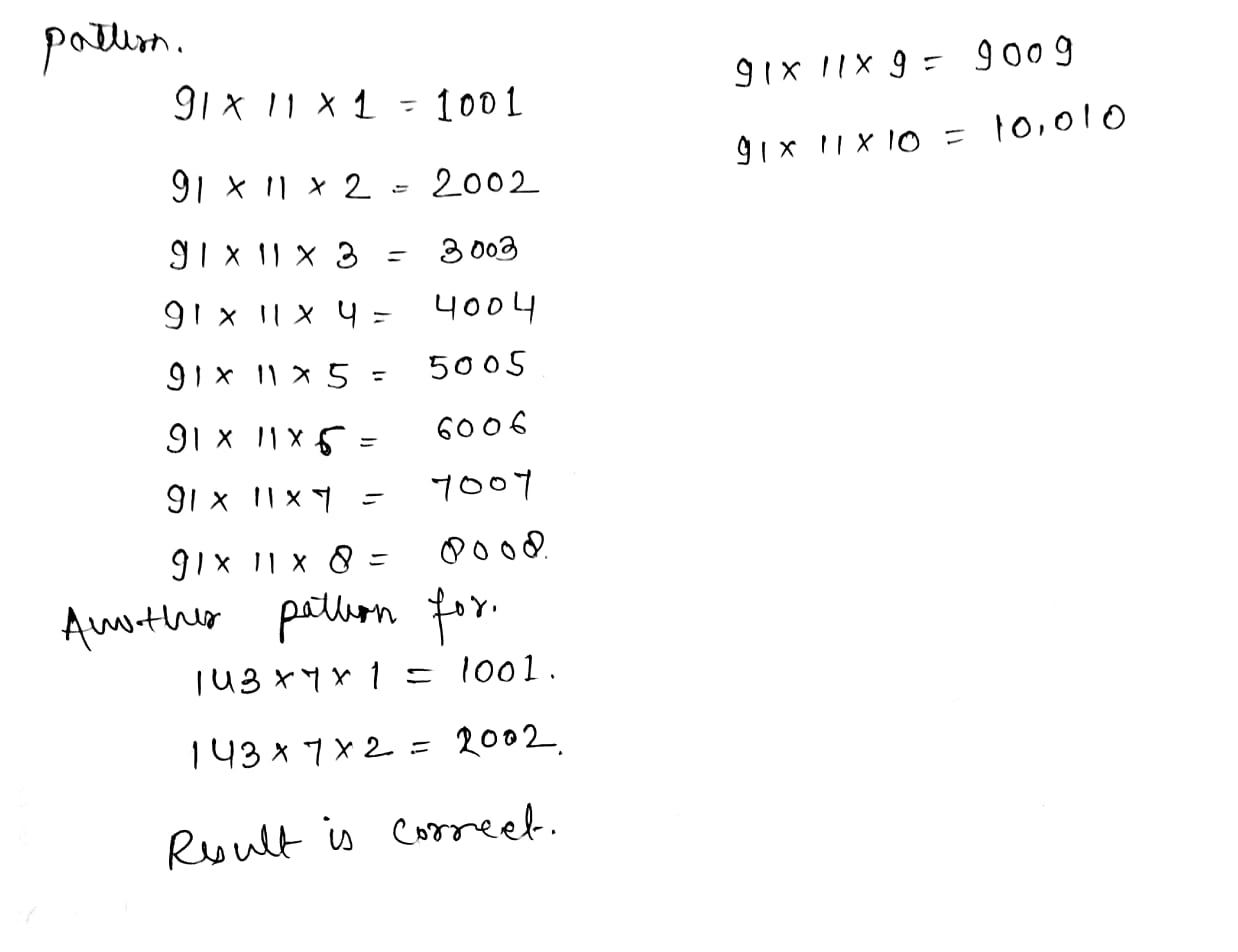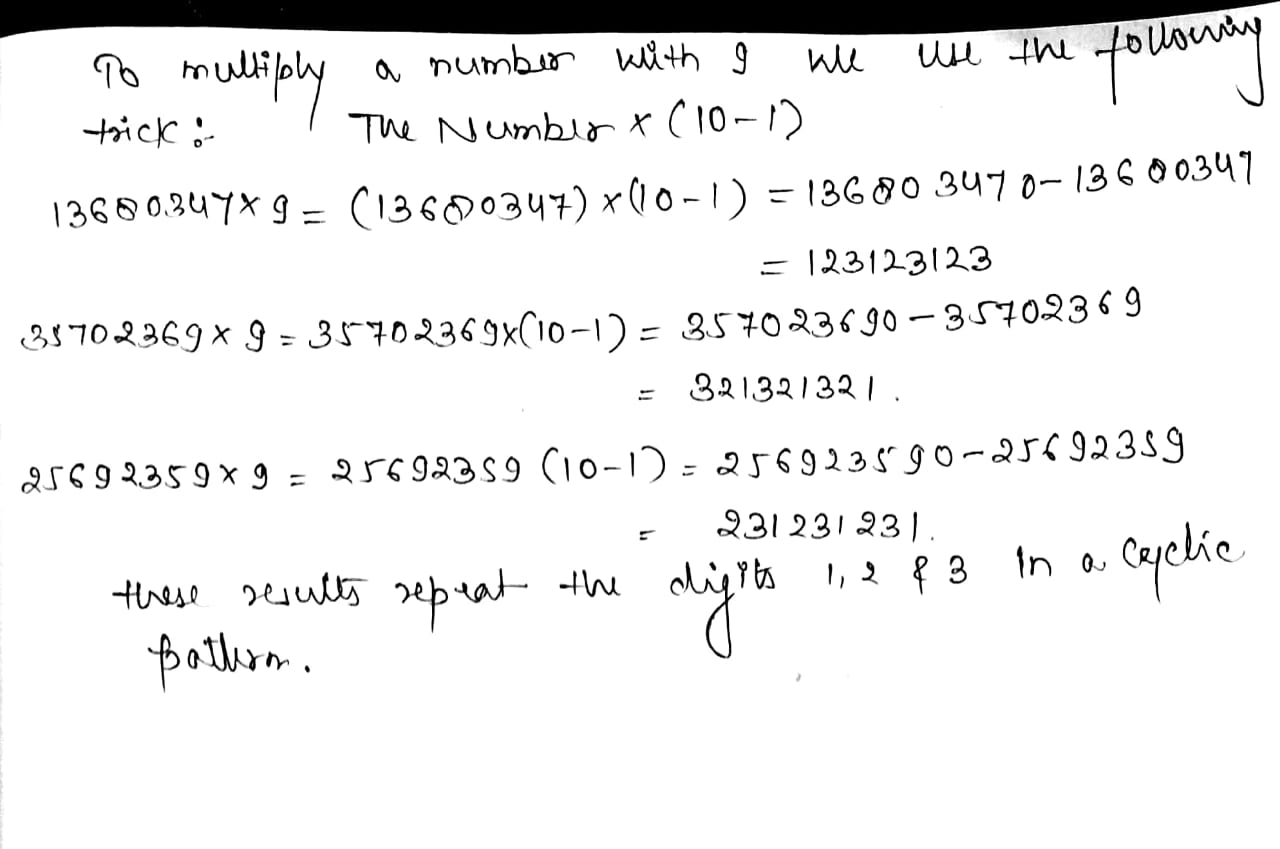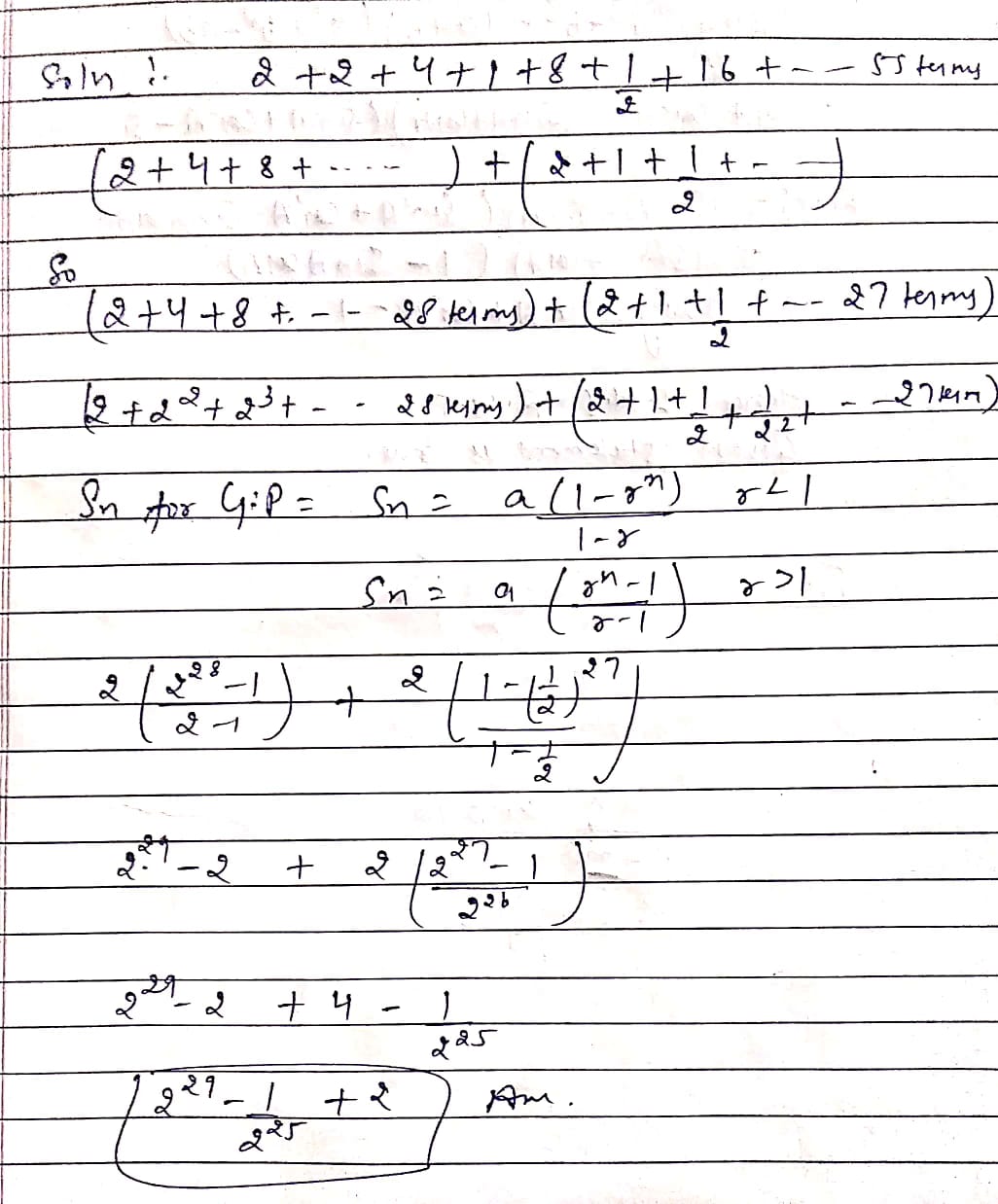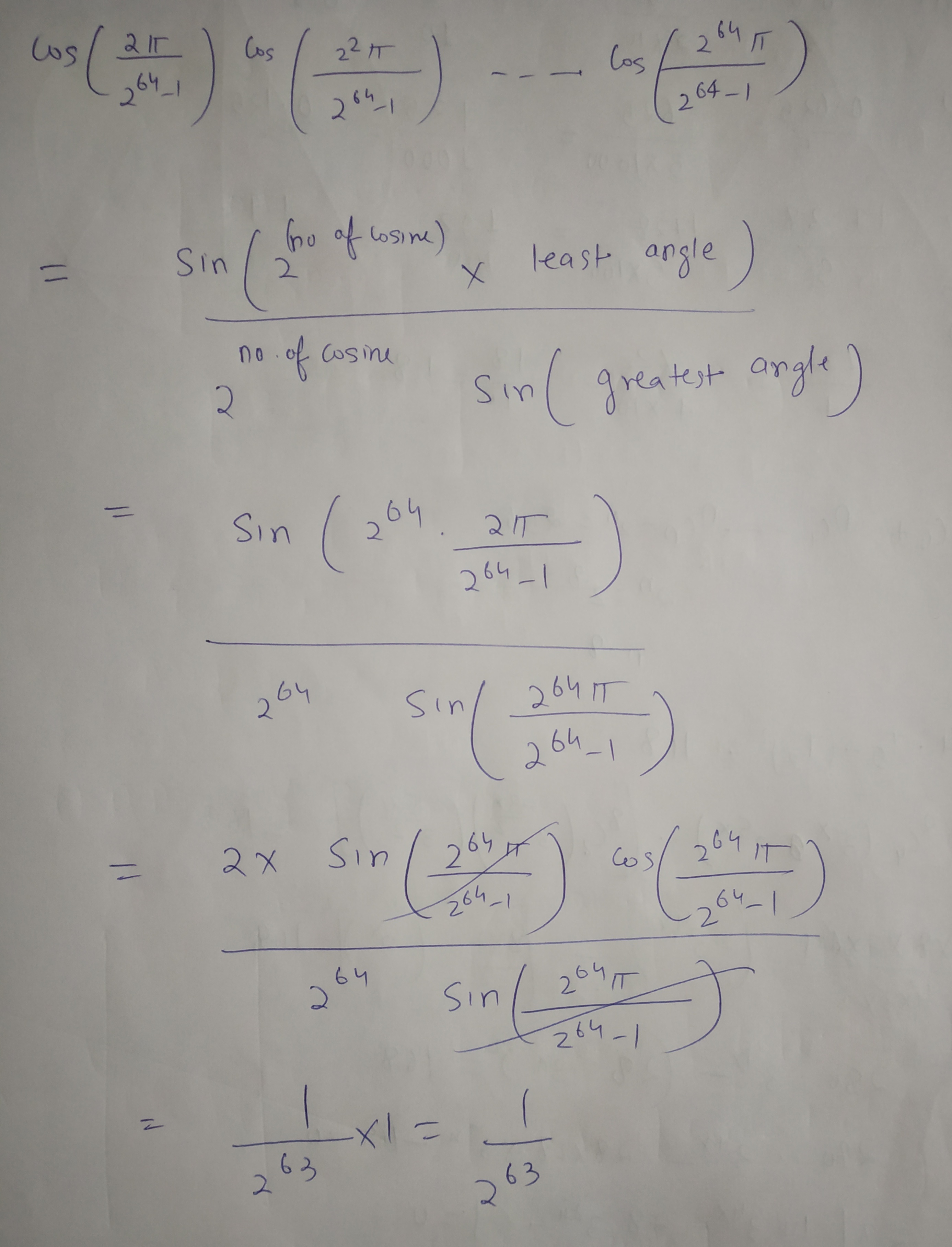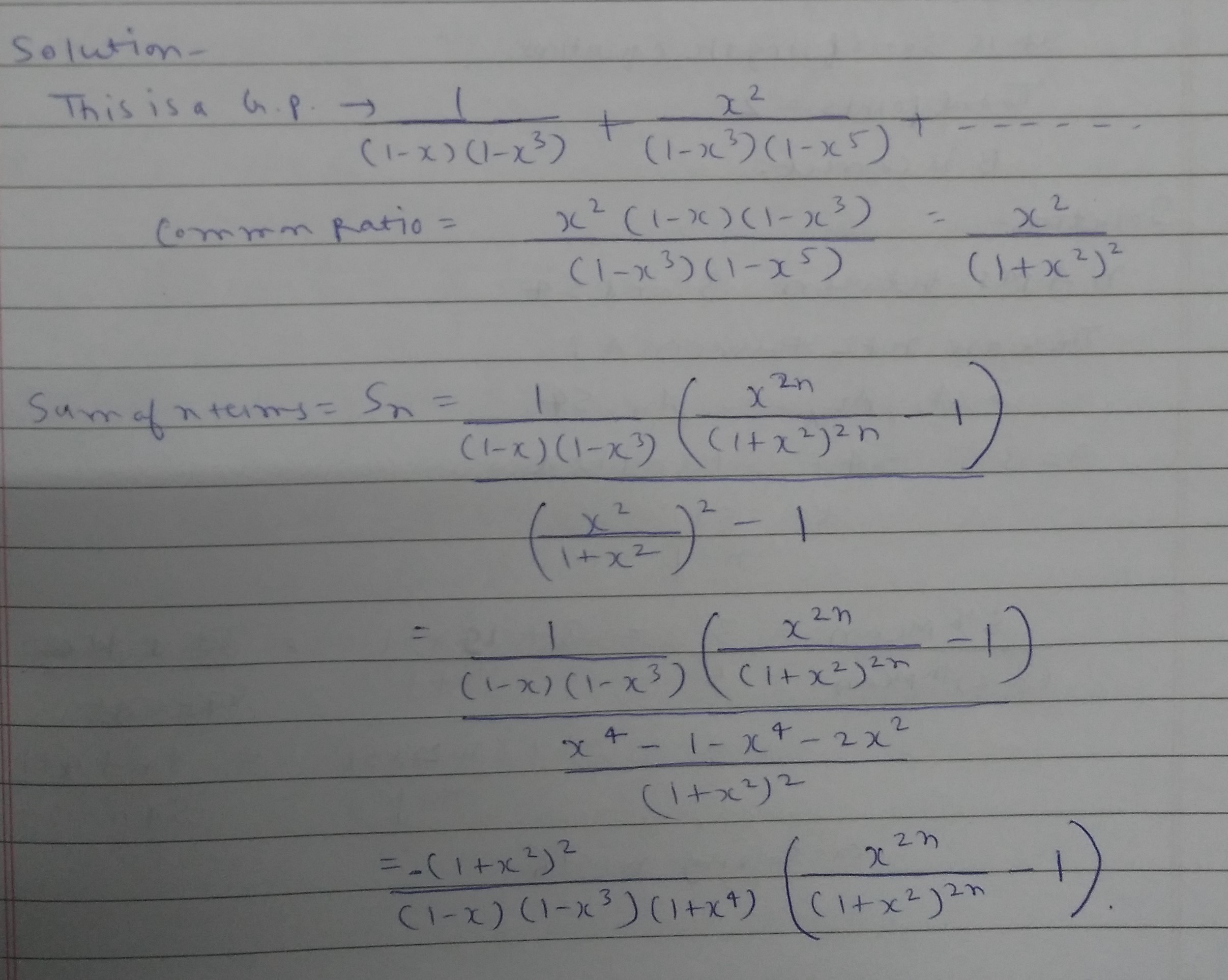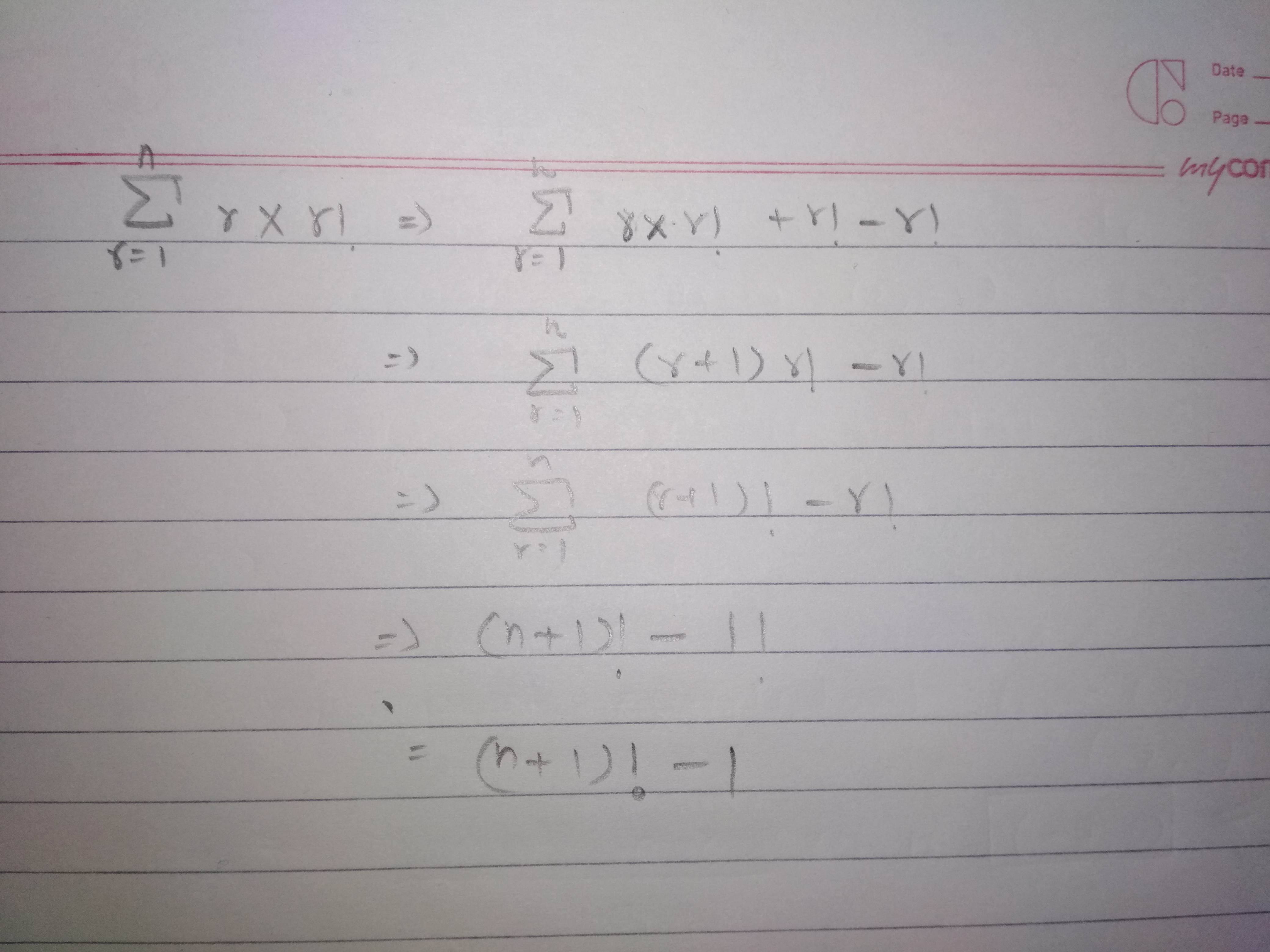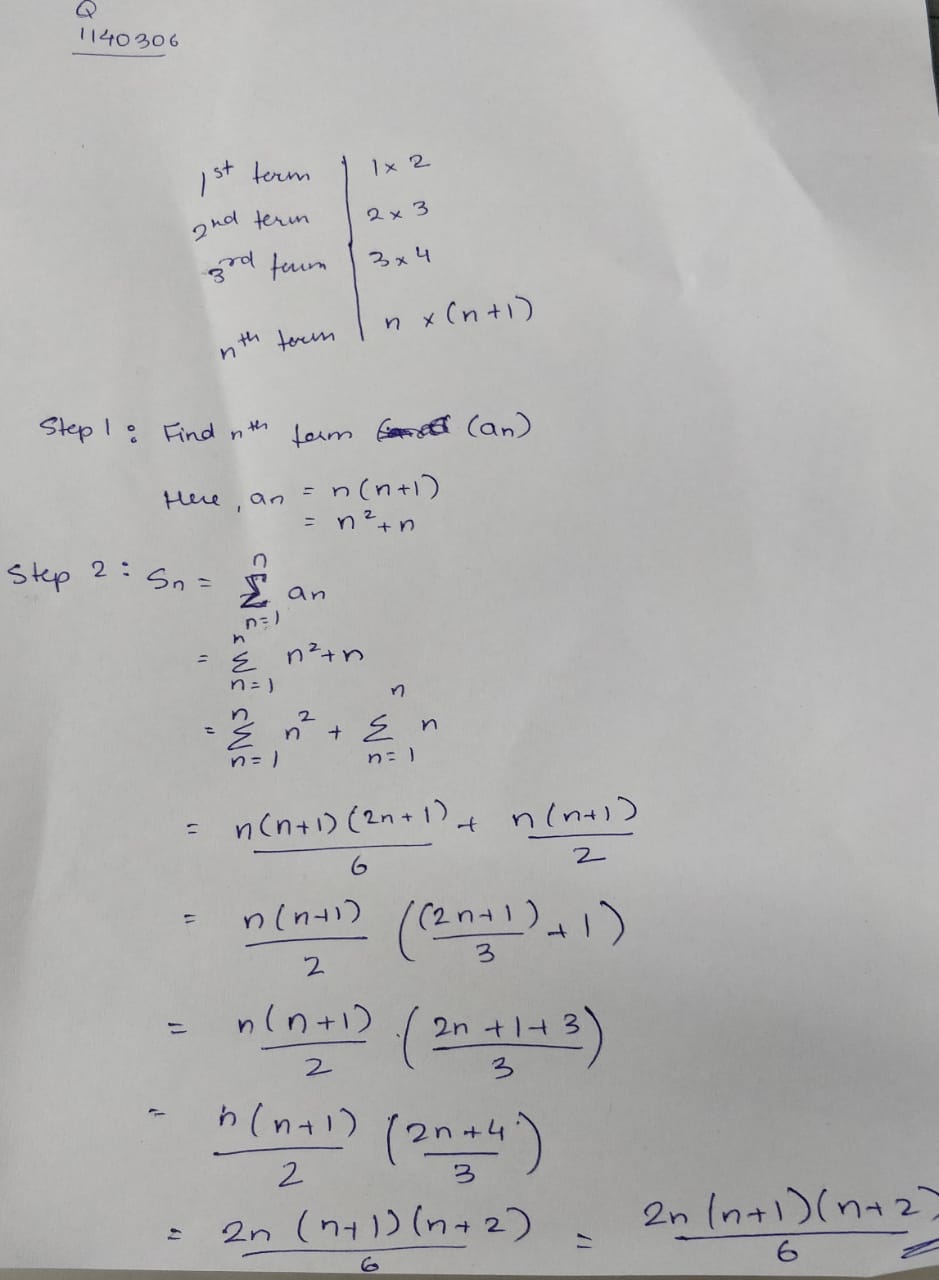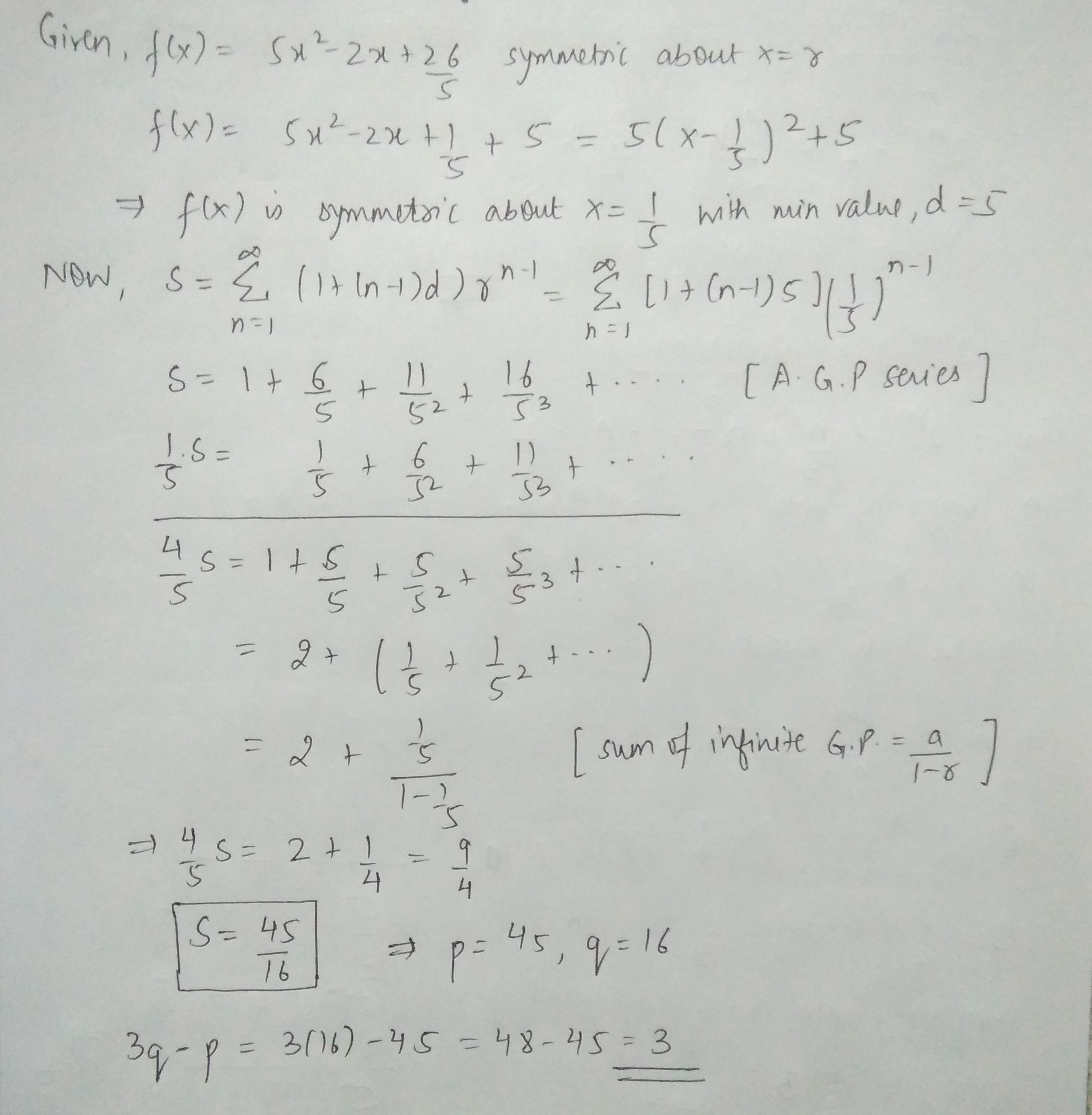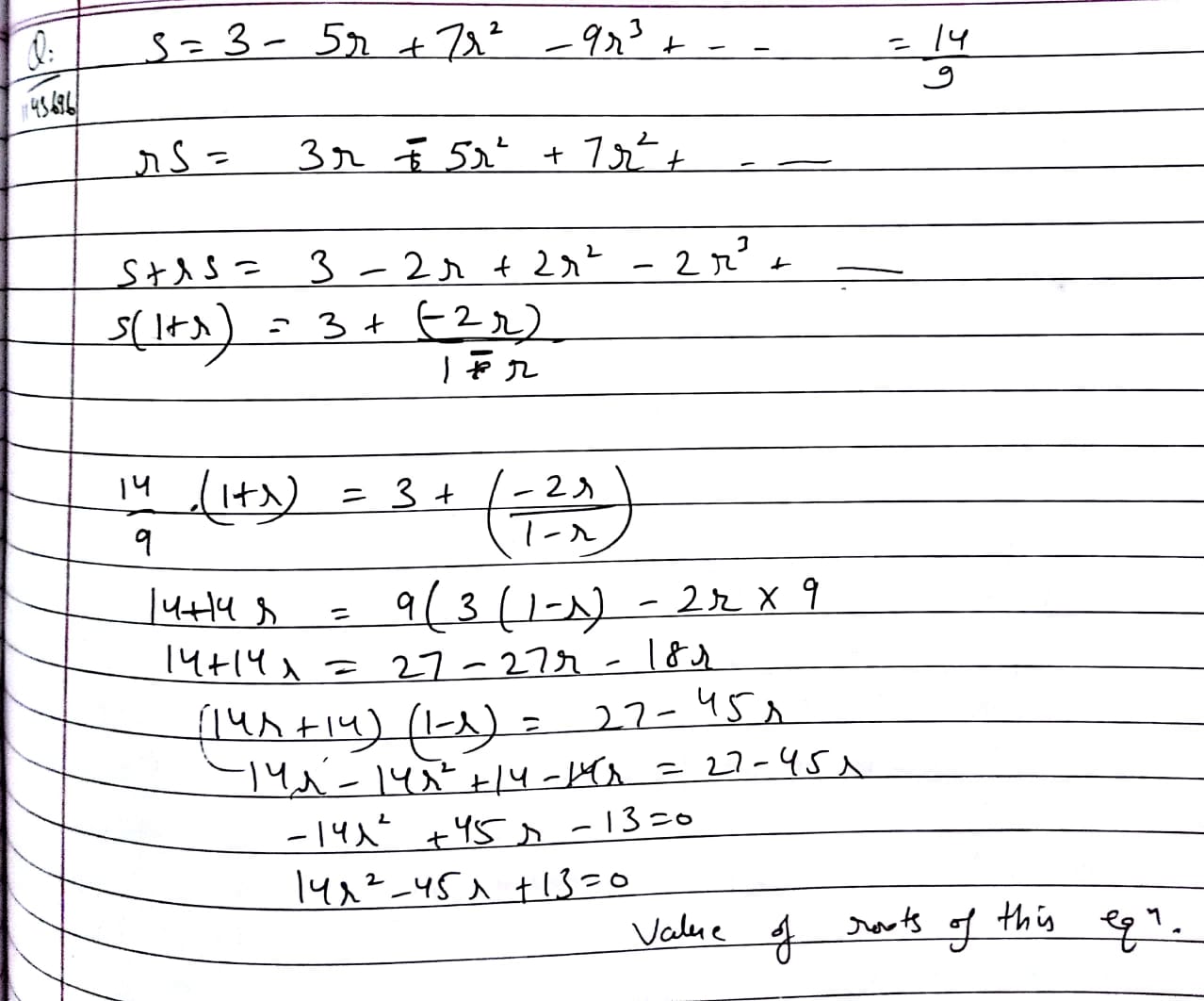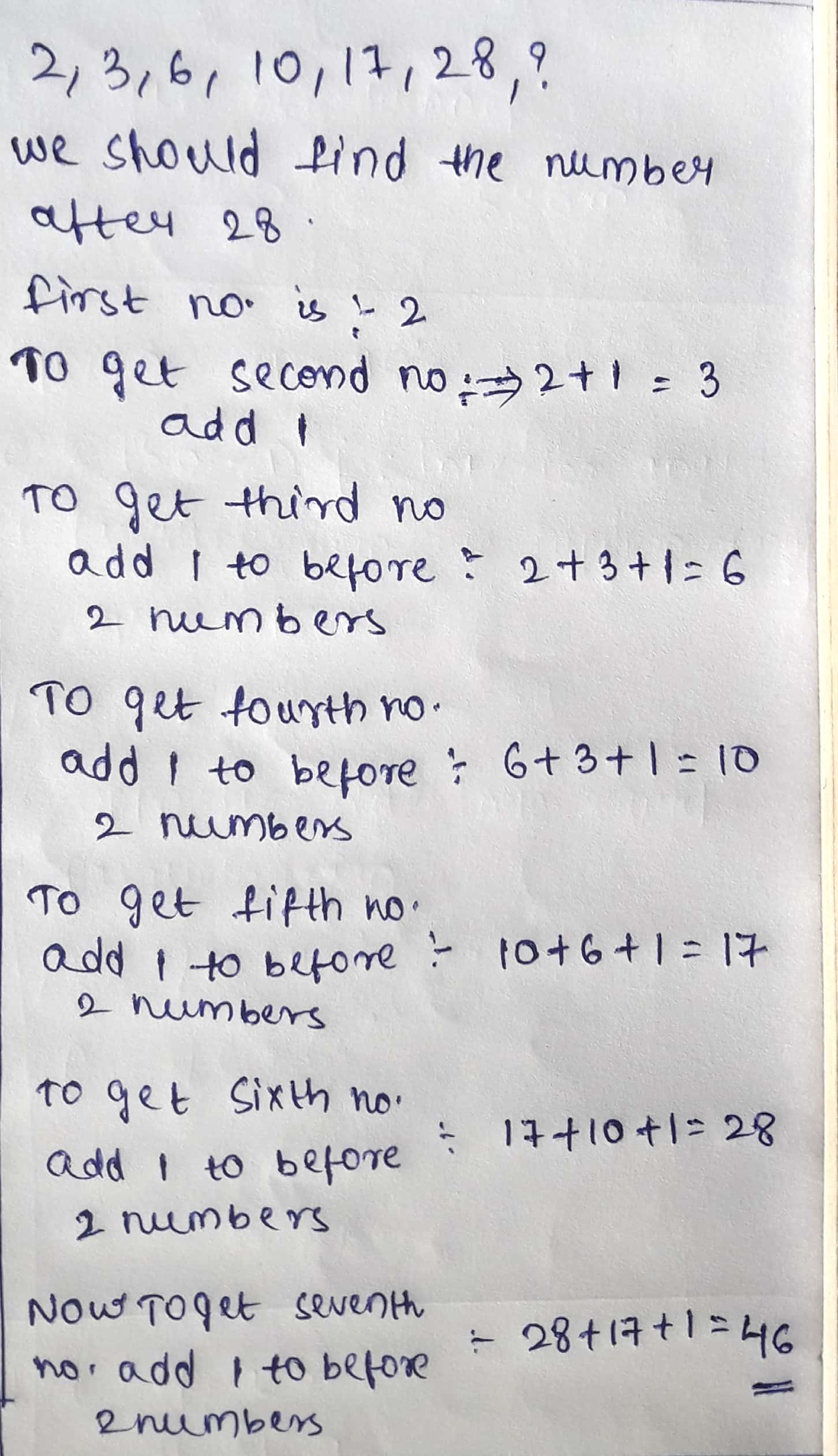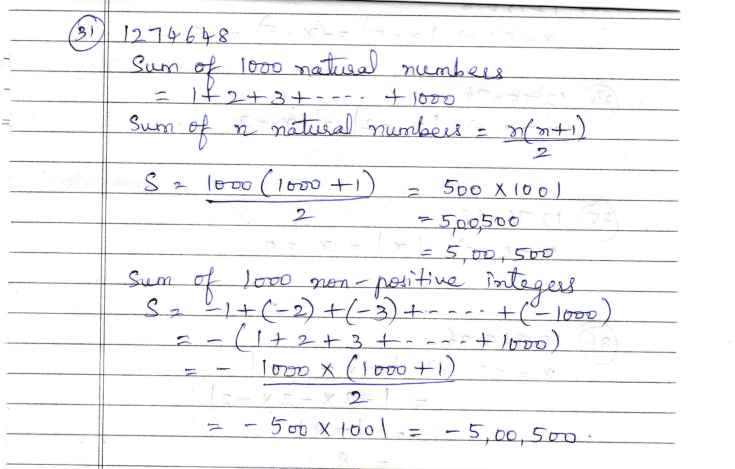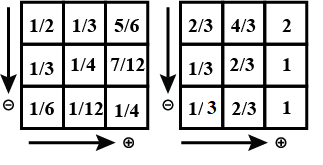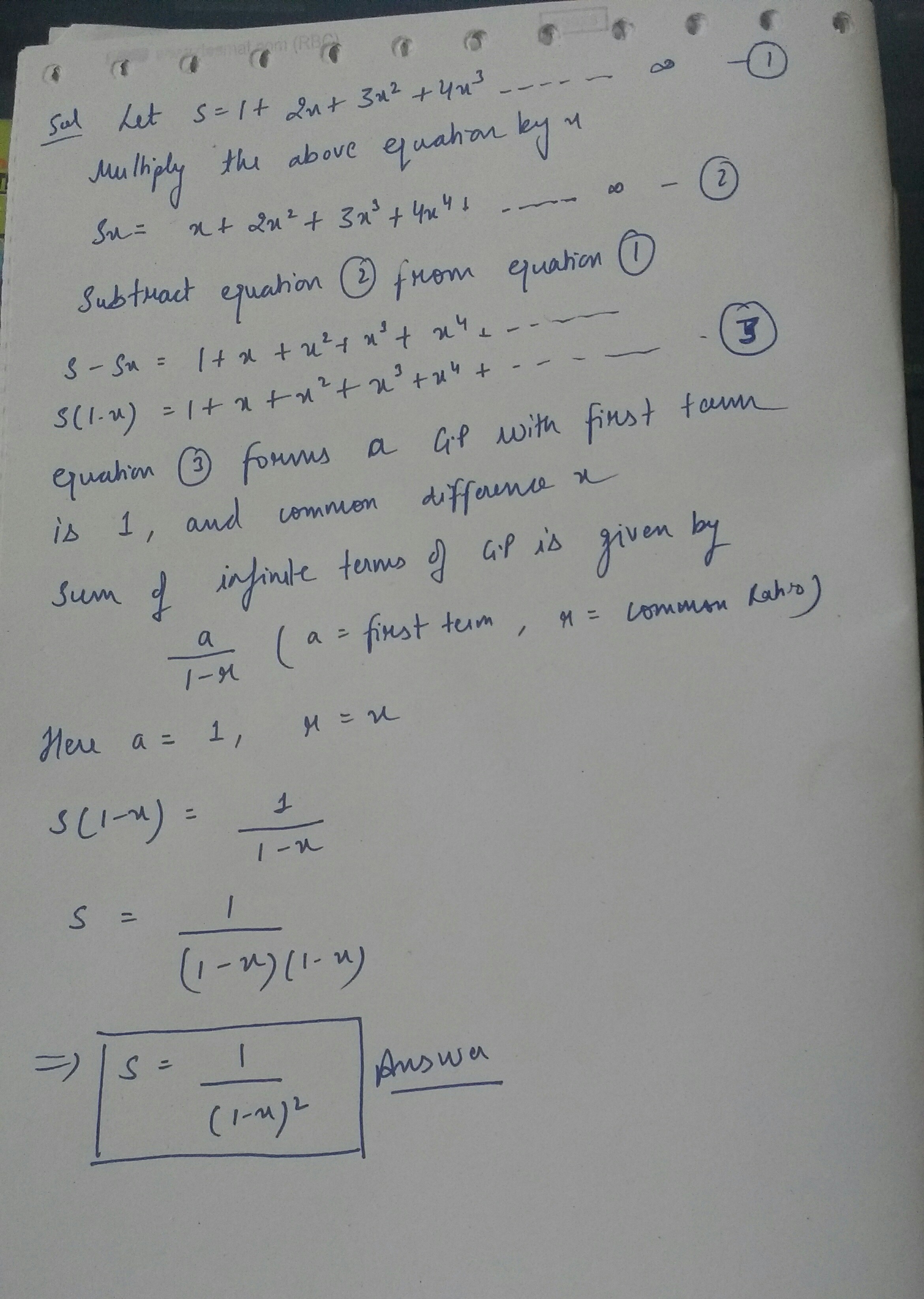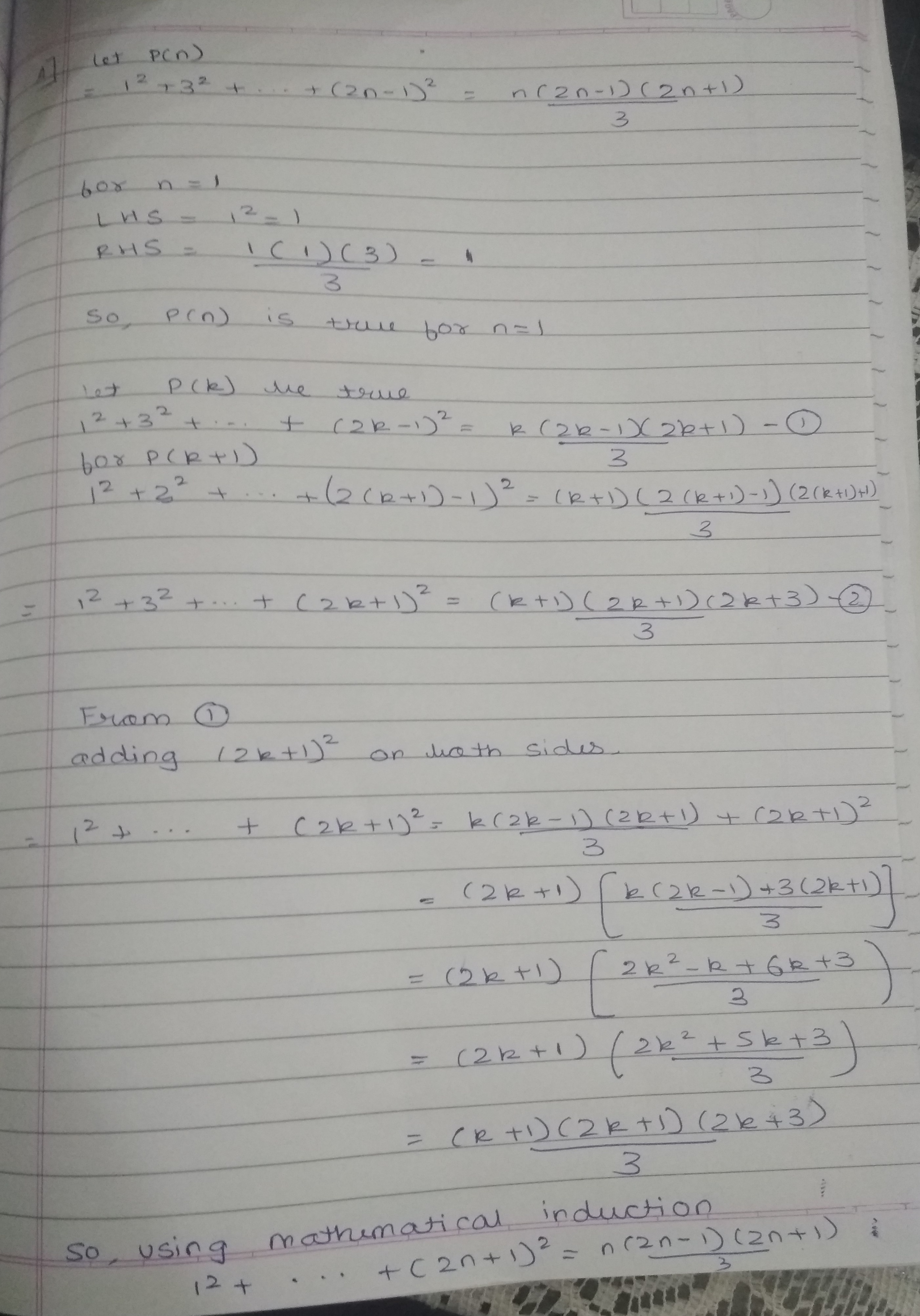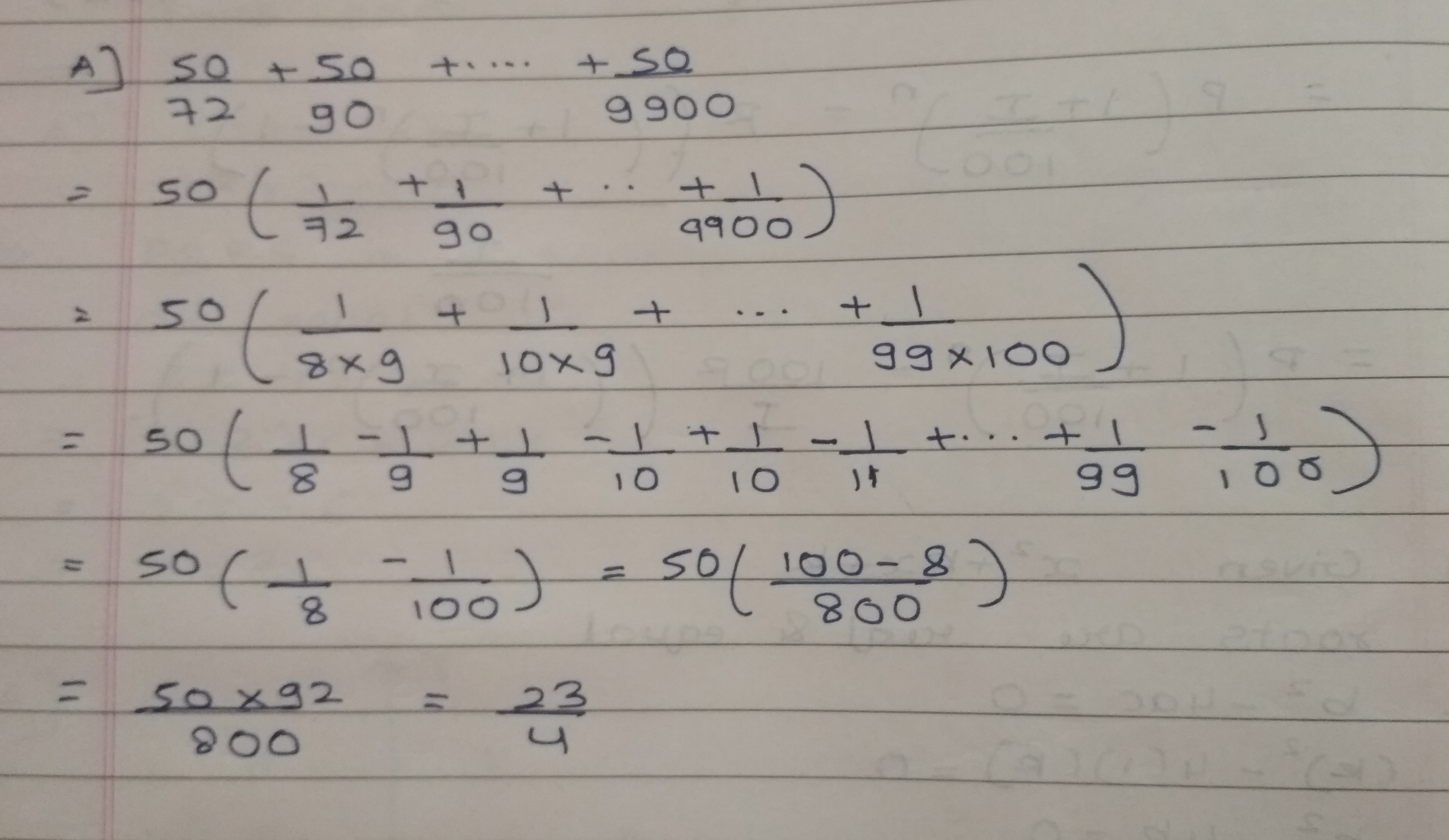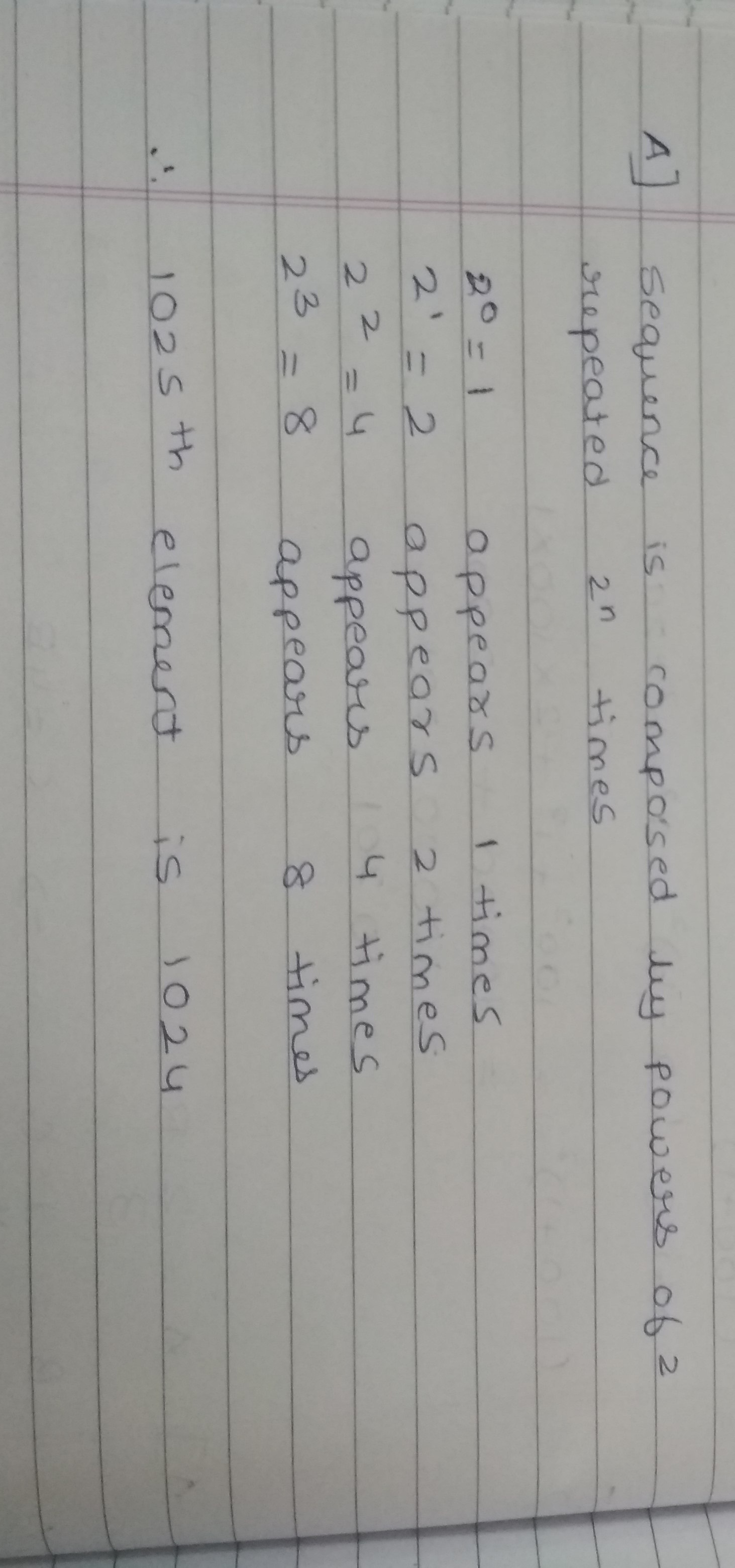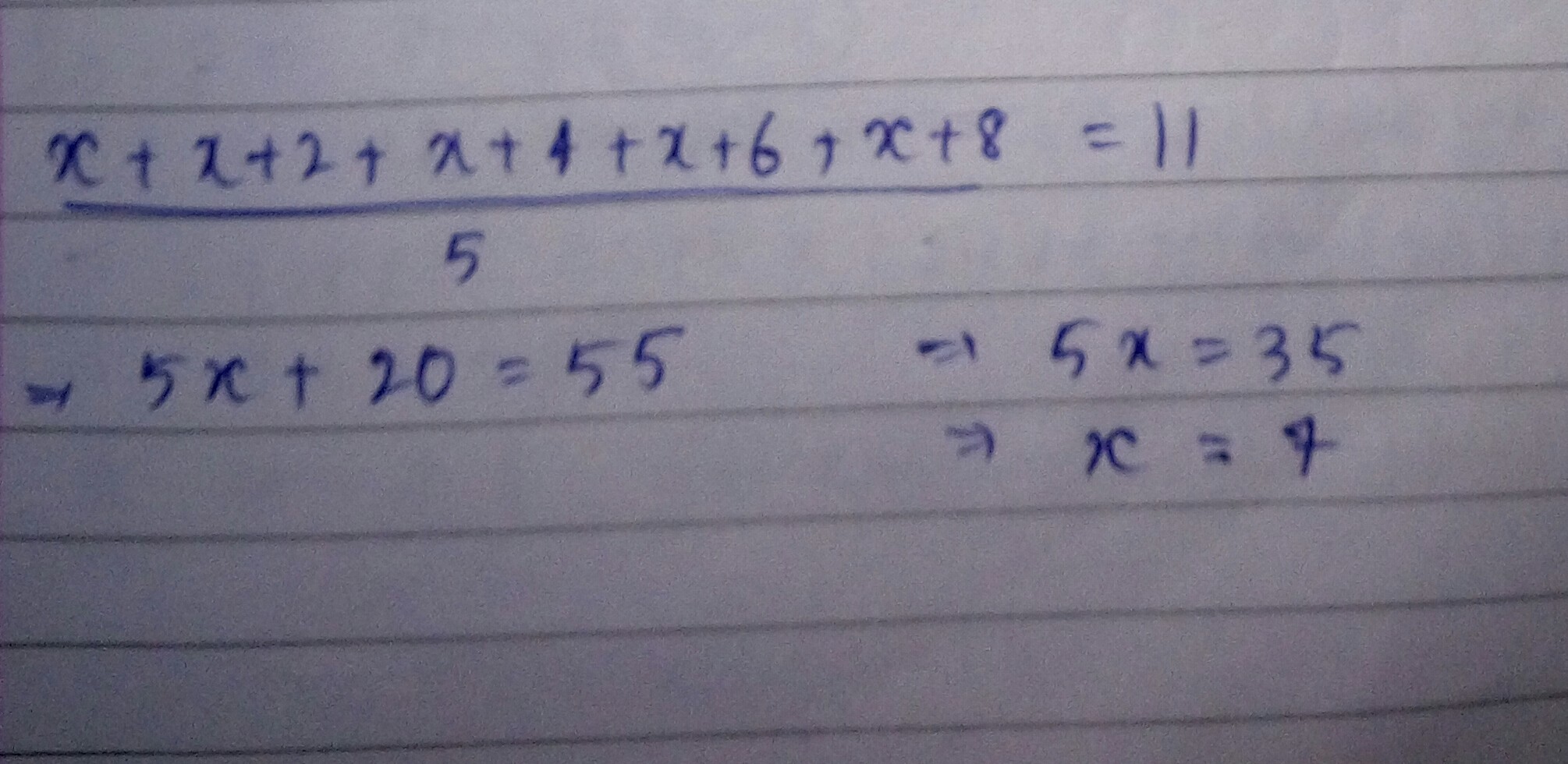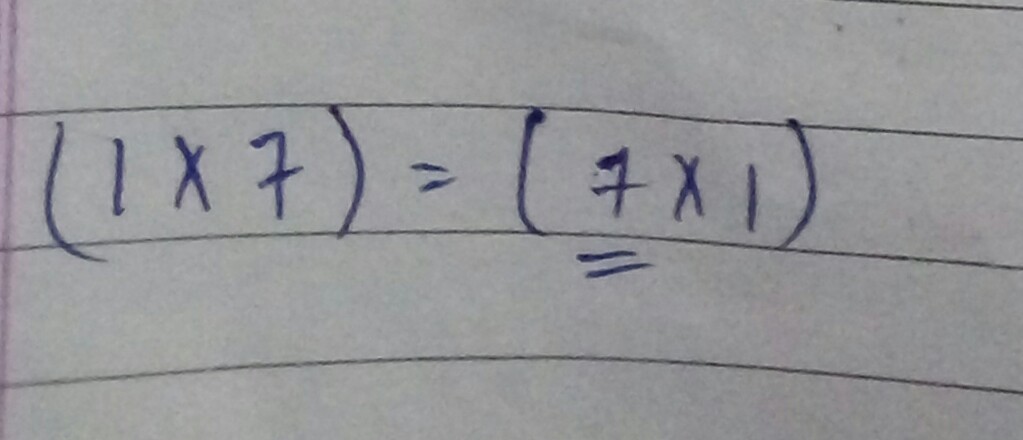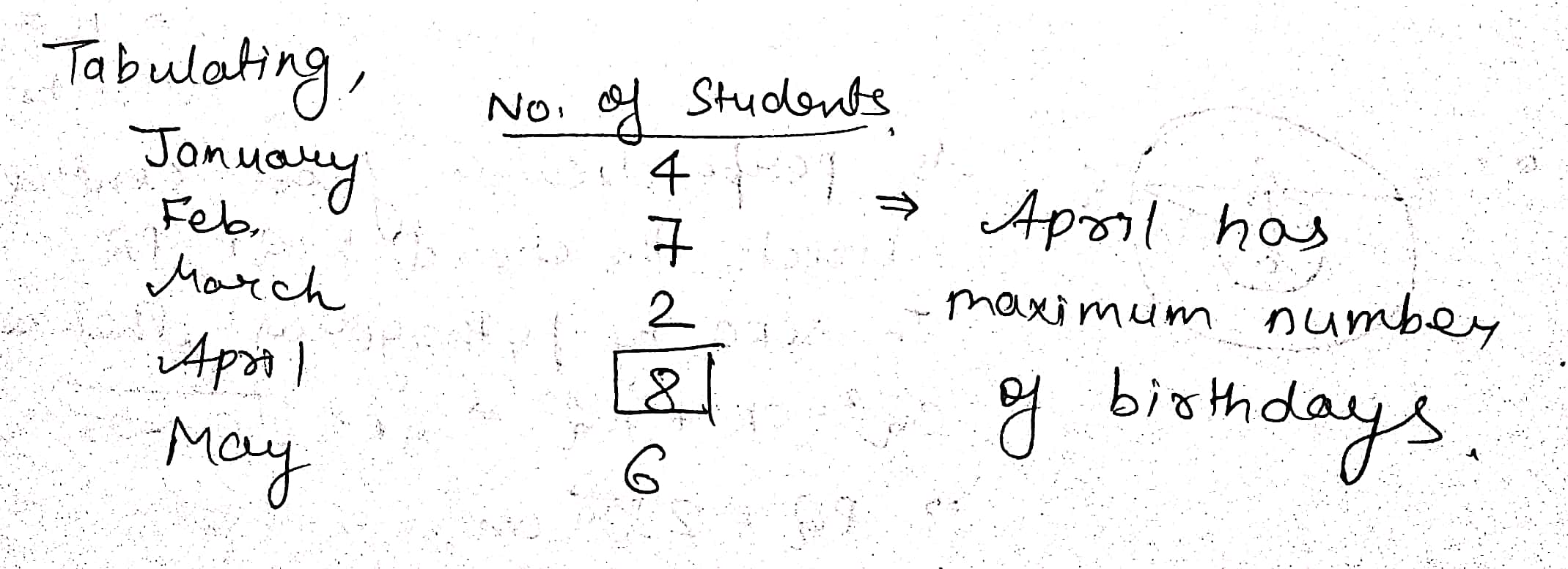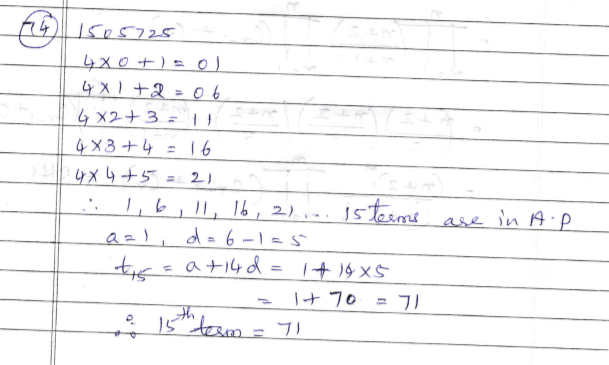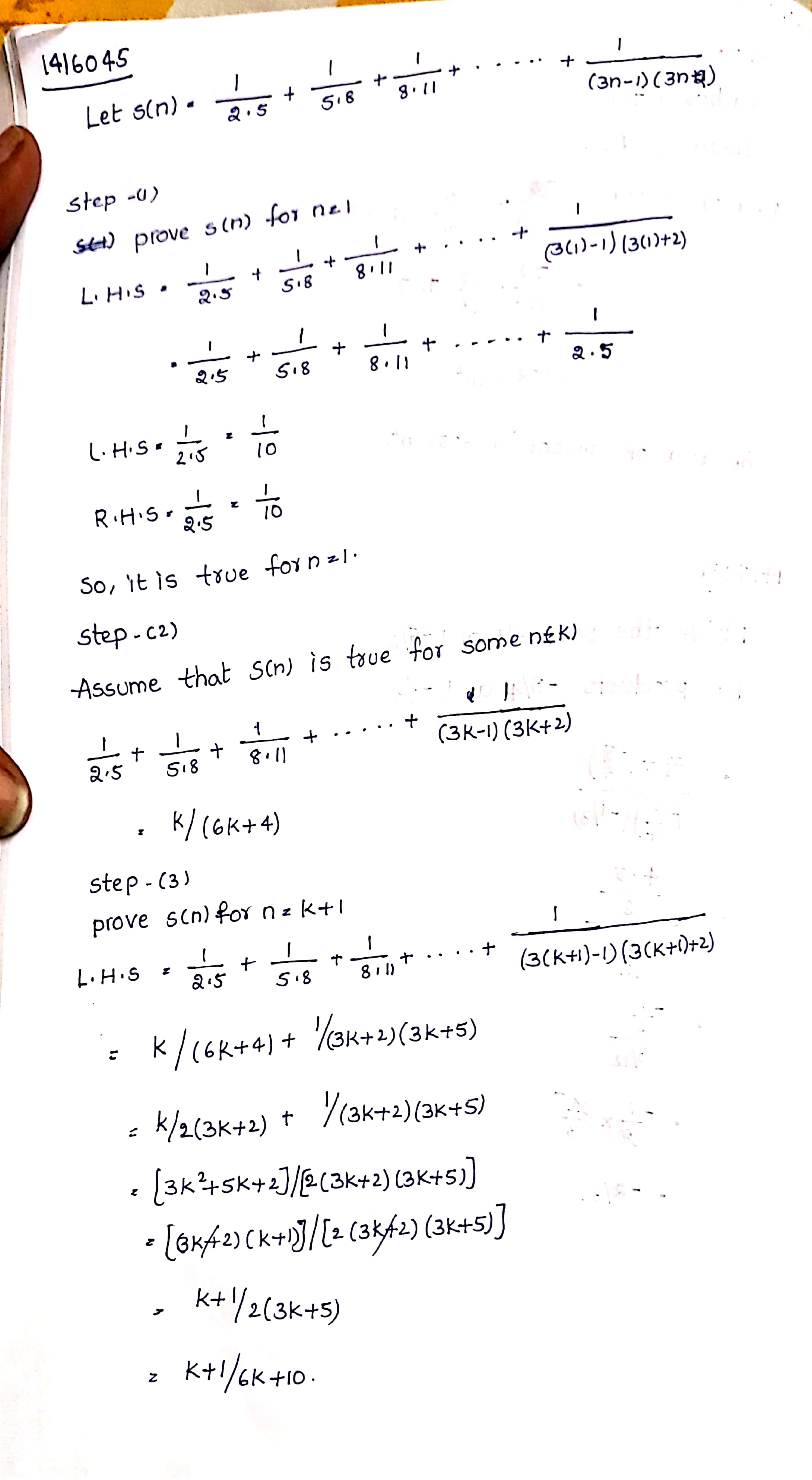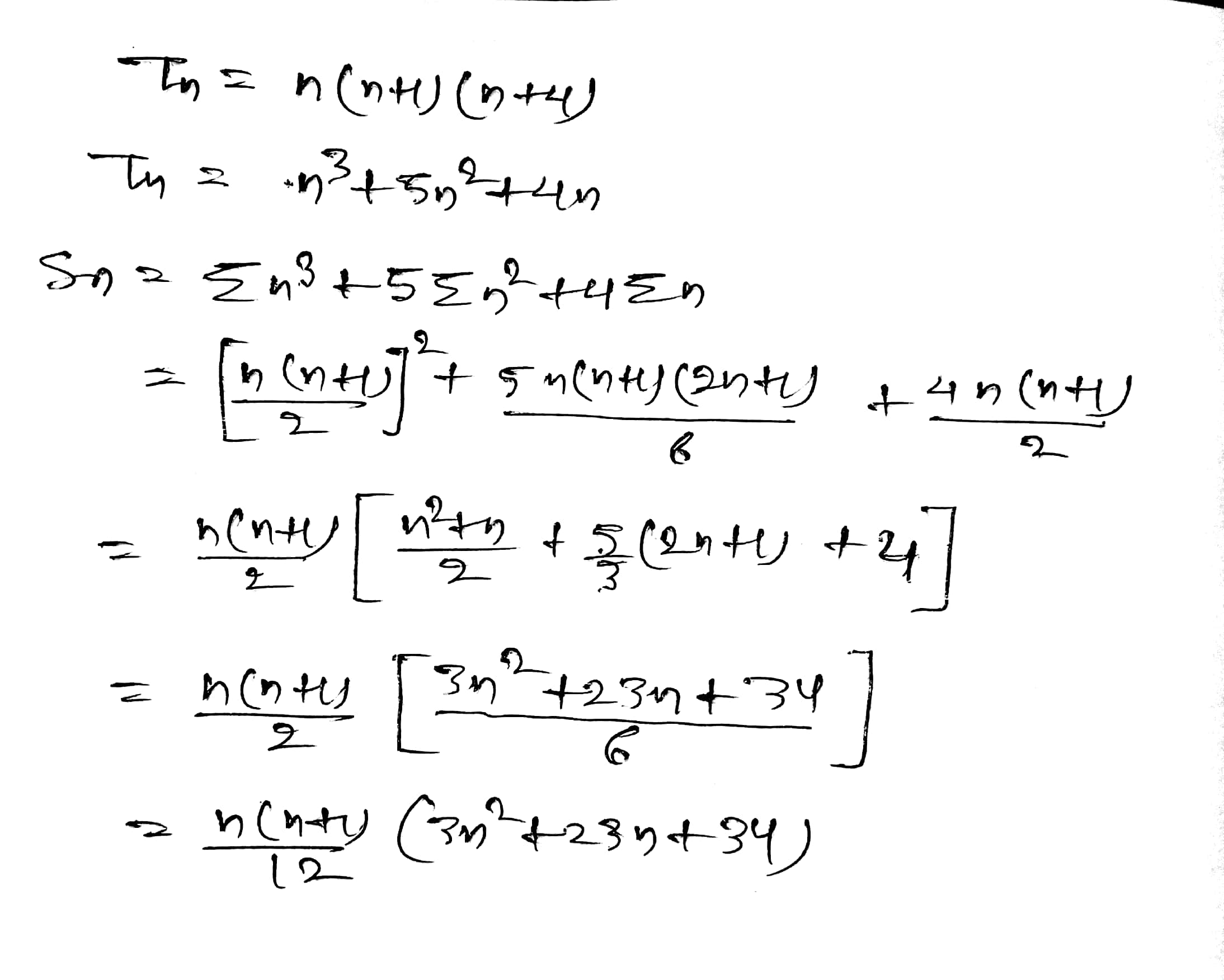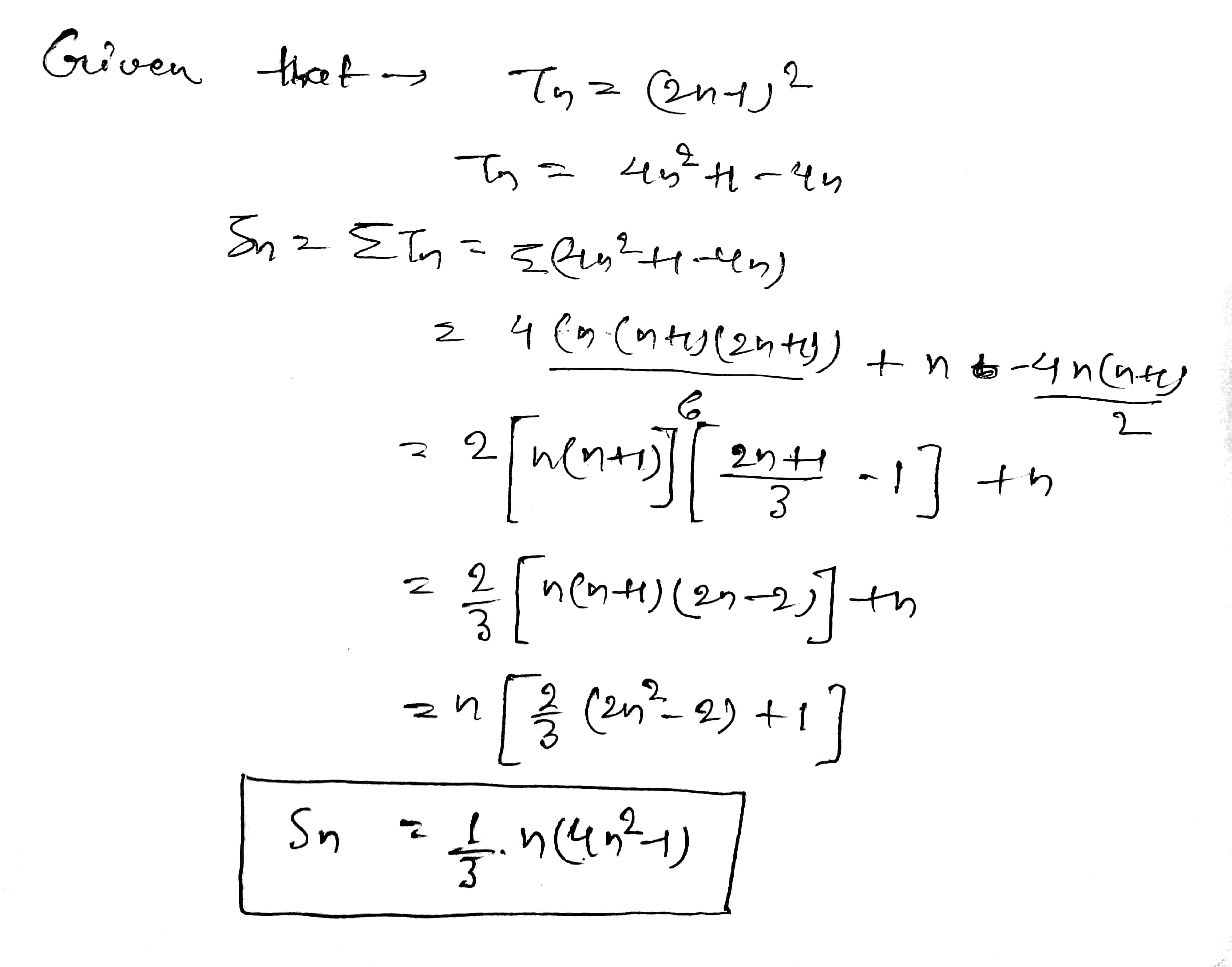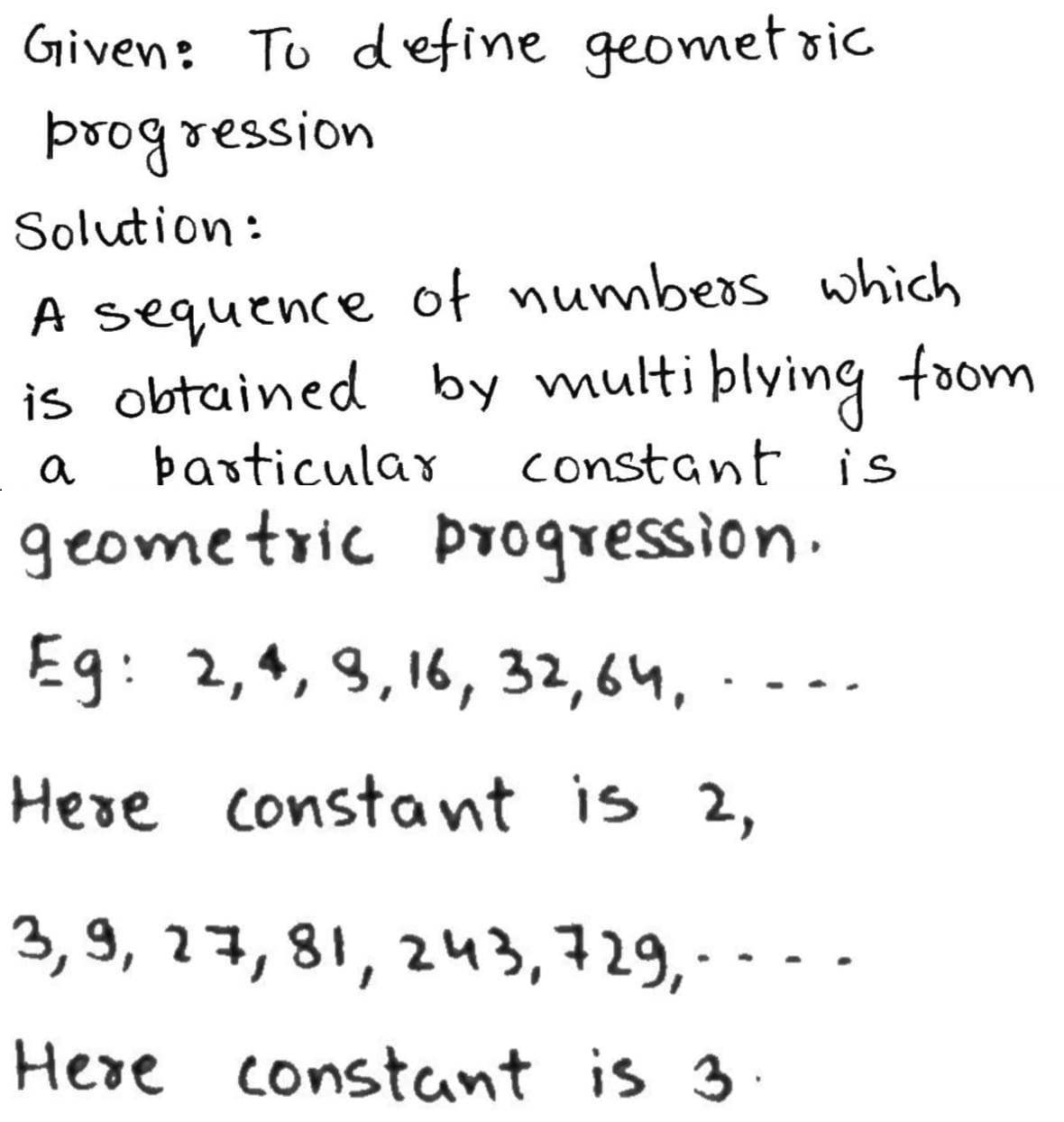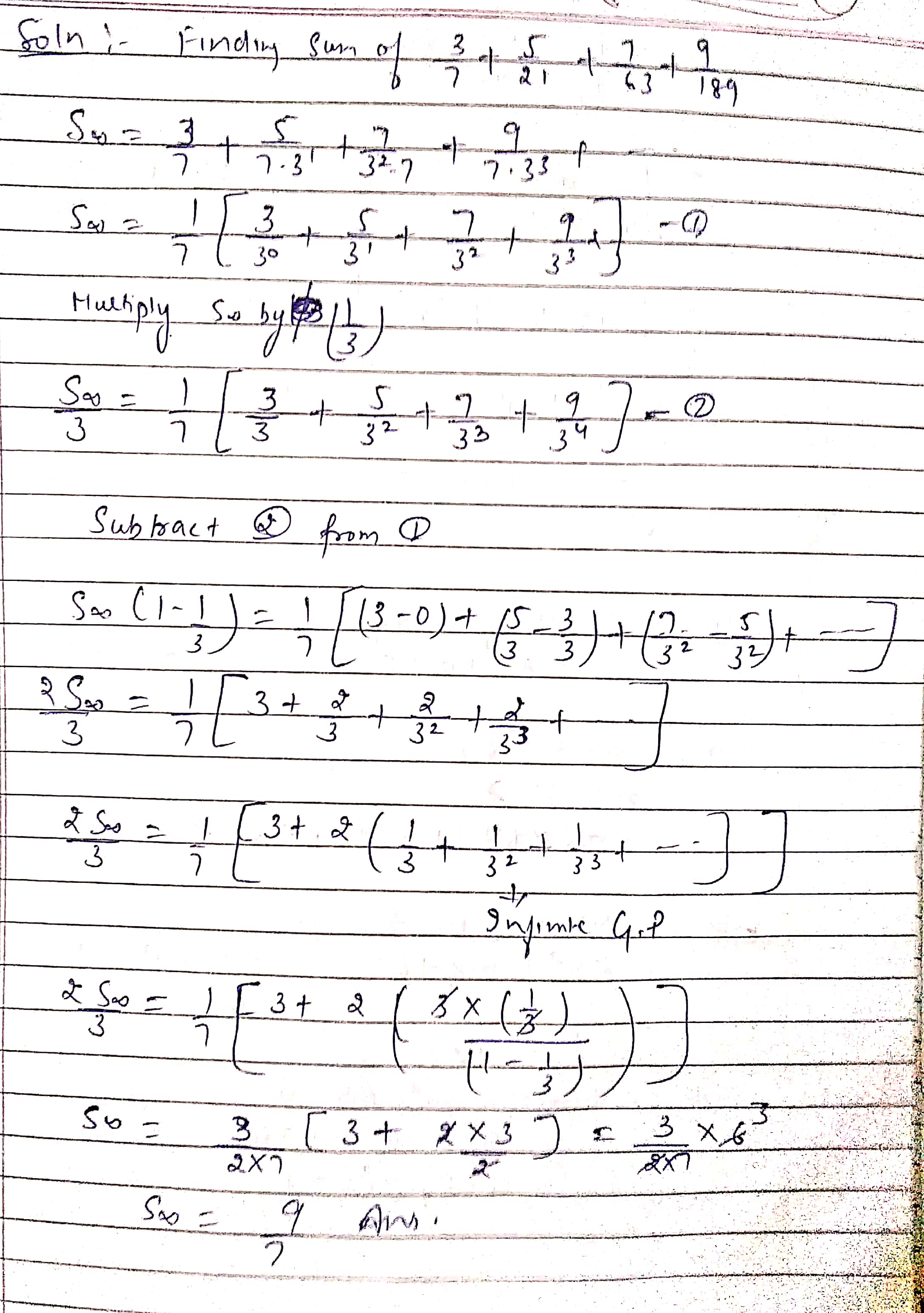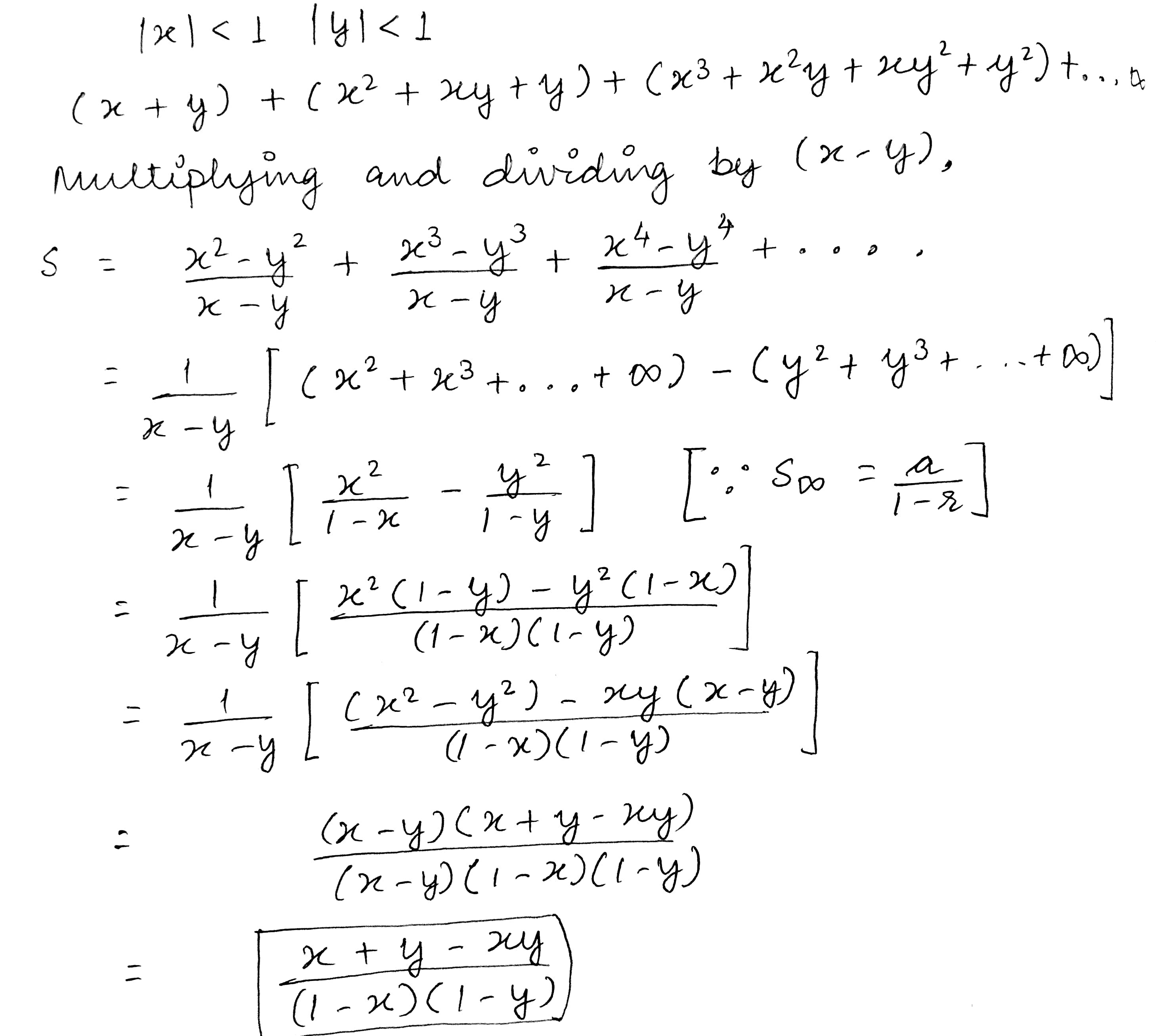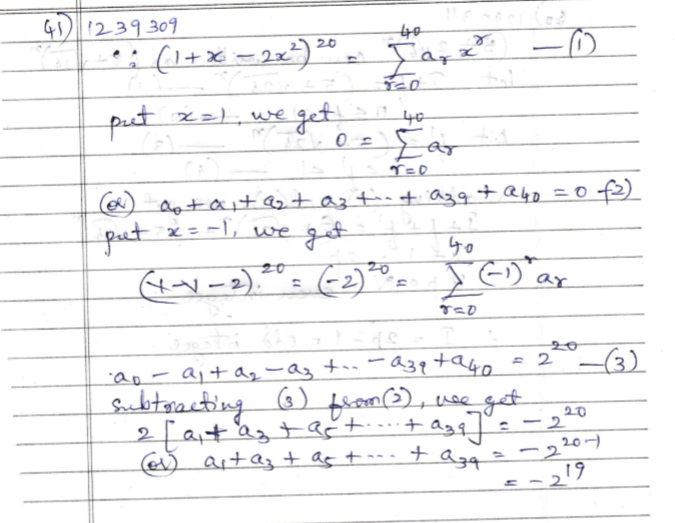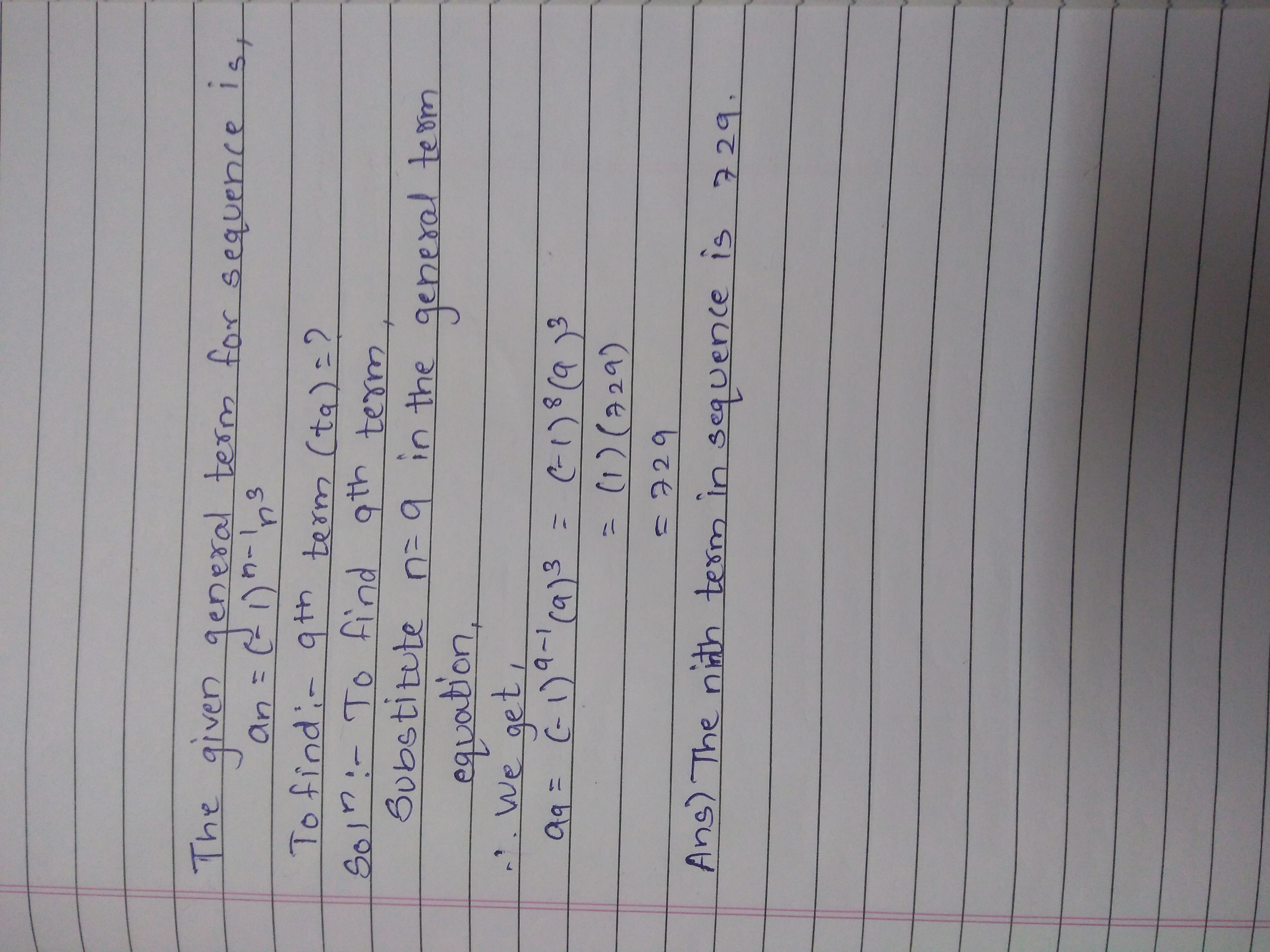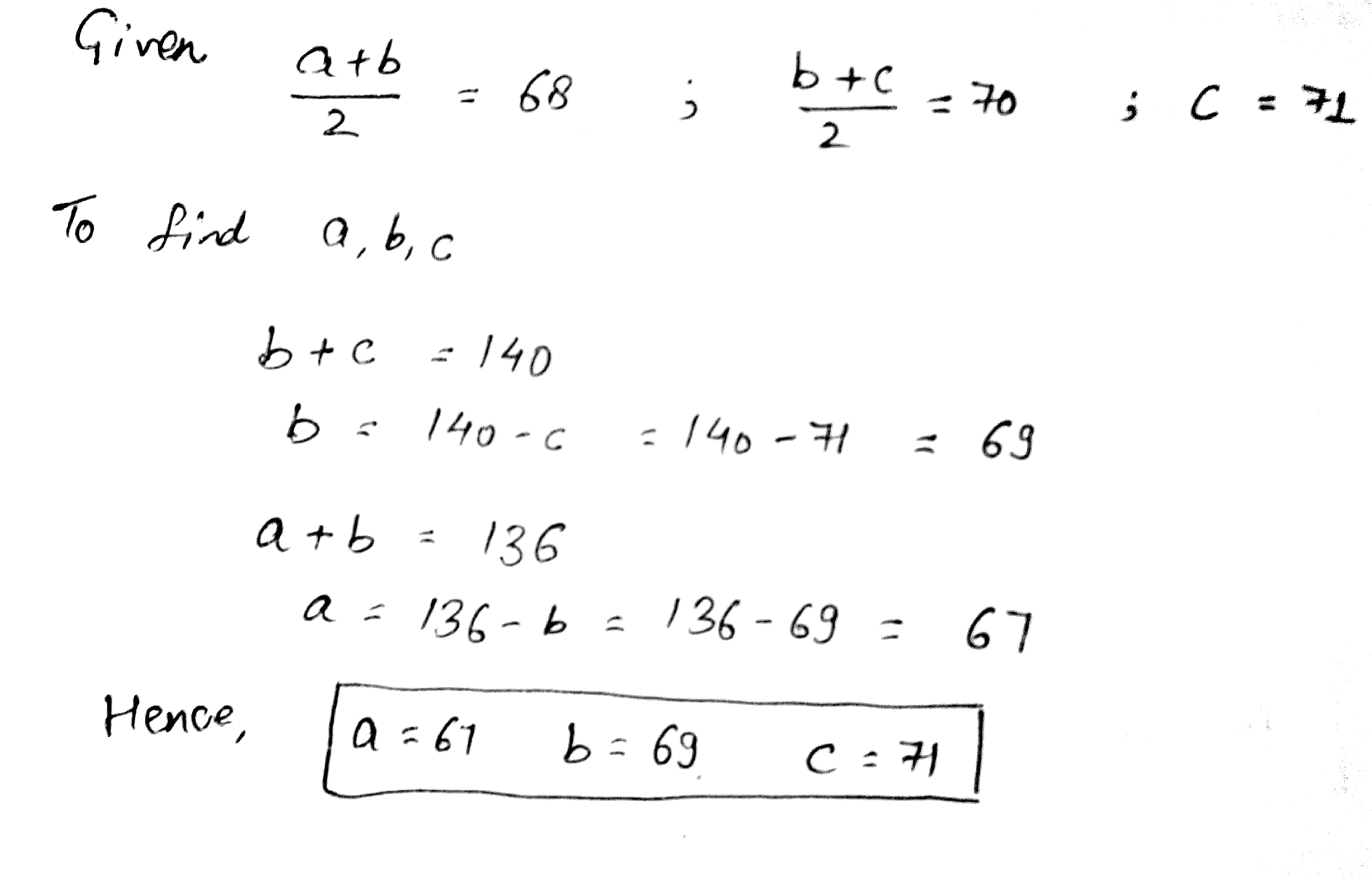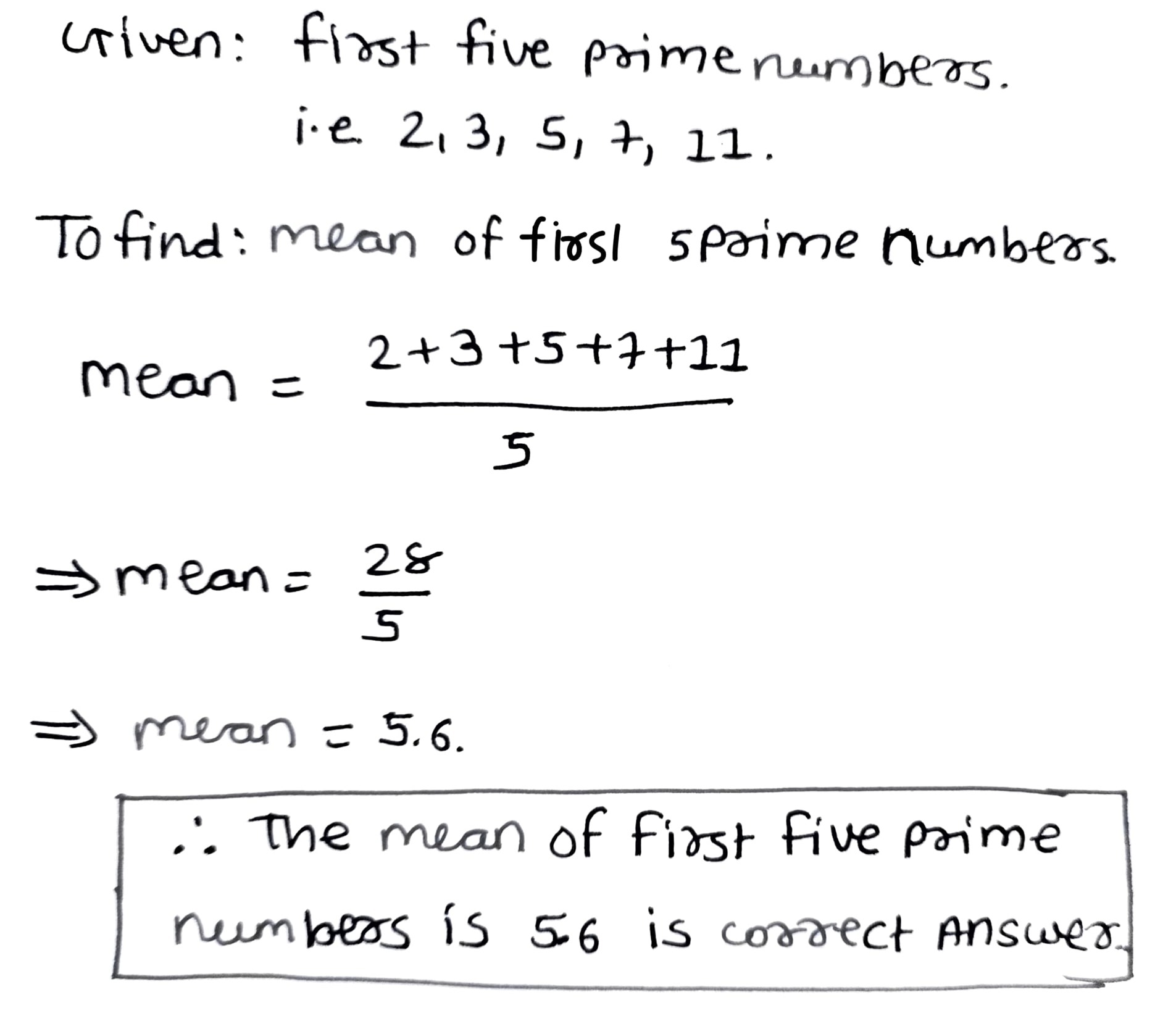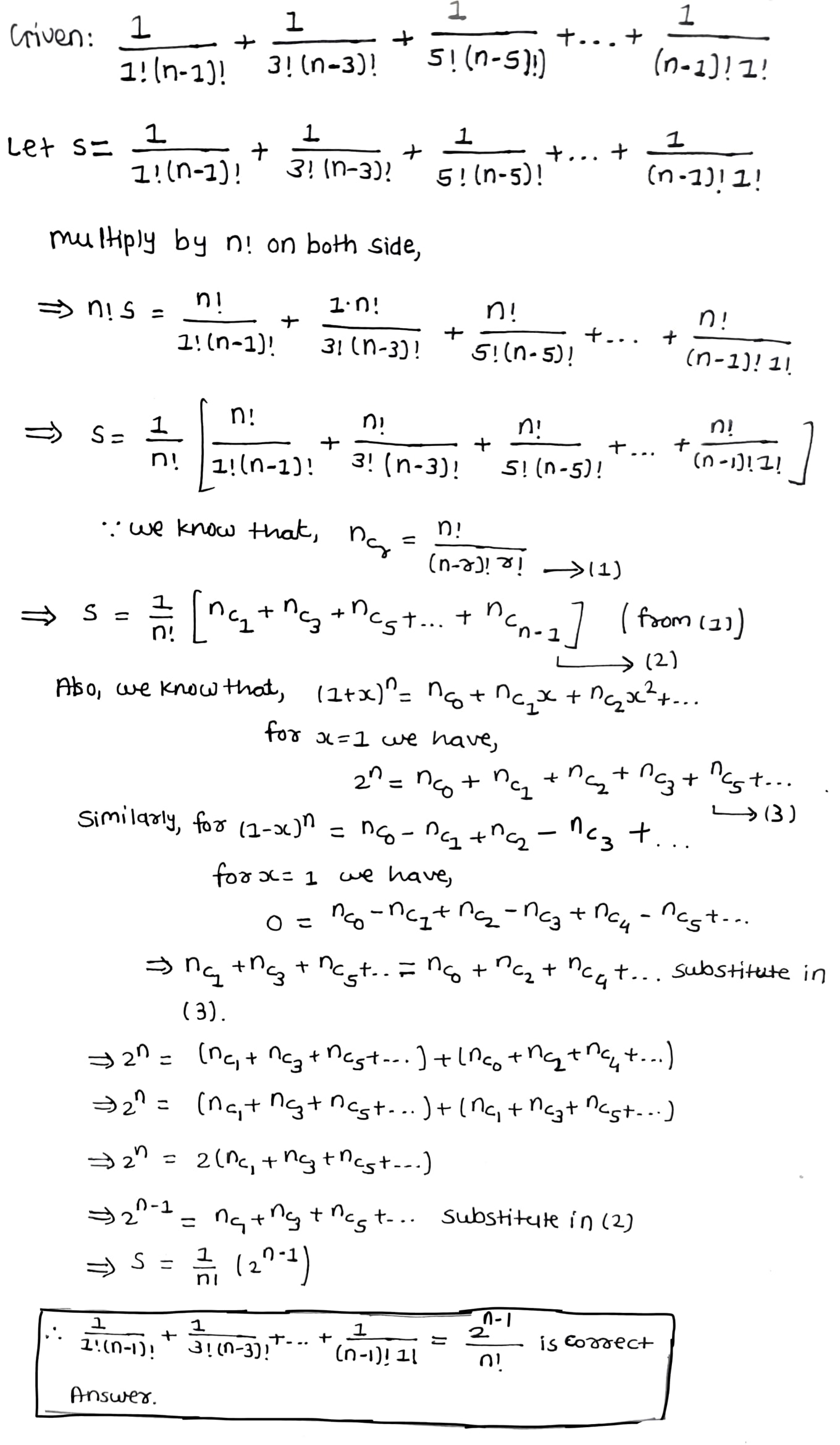Sequences And Series - Class 11 Engineering Maths - Extra Questions
The sum of the infinite series $$\displaystyle{1+\frac{1+2}{2!} + \frac{1+2+2^2}{3!} + \frac{1+2+2^2+2^3}{4!}+ \,...}$$ is $$\displaystyle{e^y-e^x}$$ Find $$x+y^2$$
Write four more numbers in the following pattern-
$$ \displaystyle \frac{-1}{3} $$, $$ \displaystyle \frac{-2}{6} $$, $$ \displaystyle \frac{-3}{9} $$, $$ \displaystyle \frac{-4}{12} $$..........
Find the first $$3$$ terms of a G.P. if $$a = 4$$ and $$r = 2$$.
Find the sum of all natural numbers from $$1$$ to $$200$$ which are divisible by $$4$$.
Find the arithmetic mean of 4 and 6.
Find the common ratio and the general term of the following geometric sequences.
$$0.02, 0.006, 0.0018, .....$$
A.M. of $$a-2$$, $$a$$, $$a+2$$ is ____.
A water tank has steps inside it. A monkey is sitting on the top most step. (ie, the first step) The water level is at the ninth step.
(a) He jumps $$3$$ steps down and then jumps back $$2$$ step up. In how many jumps will he reach the water level?
(b) After drinking water, he wants to go back. For this, he jumps $$4$$ steps up and then jumps back $$2$$ steps down in every move. In how many jumps will he reach back the top step?
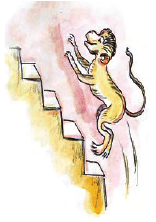
A.M. of $$1, 2, x, 3$$ is $$0$$, then $$x=$$ _____.
Complete the following patterns:
(i) $$40, 35, 30$$, __, __, __
(ii) $$0, 2, 4$$, ___ , ___ , ___ .
(iii) $$84, 77, 70$$, ___ , ___ , ___ .
(iv) $$4.4, 5.5, 6.6$$, ___ , ___ , ___ .
(v) $$1, 3, 6, 10$$, ___ , ___ , ___ .
(vi) $$1, 1, 2, 3, 5, 8, 13, 21$$, ___ , ___ , ___ . (This sequence is called FIBONACCI SEQUENCE)
(vii) $$1, 8, 27, 64$$, ___ , ___ , ___ .
A geometric series consists of four terms and has a positive common ratio. The sum of the first two terms is 8 and the sum of the last two terms is $$72$$. Find the series
Find the sum of n terms of the series $$\left(4-\displaystyle\frac{1}{n}\right)+\displaystyle \left(4-\frac{2}{n}\right)+\displaystyle \left(4-\frac{3}{n}\right)+$$........
Write the smallest $$7-$$digits largest and smallest number having three different digits.
$$\dfrac{1}{{1.2.3}} + \dfrac{1}{{2.3.4}} + \dfrac{1}{{3.4.5}} + \,..... + \dfrac{1}{{n\left( {n + 1} \right)\left( {n + 2} \right)}} = \dfrac{{n\left( {n + 3} \right)}}{{4\left( {n + 1} \right)\left( {n + 2} \right)}}$$
Solve: $$\displaystyle \sum_{n = 1}^{13}(t^n - t^{n + 1}) =$$
If $$\alpha ,\,\beta \,,\gamma $$ are in A.P. show that $$\cot\,\beta = \dfrac{{\sin \alpha - \sin \gamma }}{{\cos \gamma - cos\alpha }}.$$
complete the table . what do you notice about the numbers in the orange band ?
| 1 | 7 | 13 |
| 2 | 8 | 14 |
| 3 | 9 | 15 |
| 4 | 10 | 16 |
| 5 | 11 | 17 |
| 6 | 12 |
$${ a }_{ 1 }=5;{ a }_{ 4 }=9\dfrac { 1 }{ 2 }$$ find $${ a }_{ 2 },{ a }_{ 3 }$$
If,
$$ 1, 5, 8=76$$
$$ 2, 7, 3=25$$
$$ 3, 4, 9=89$$
$$ 4, 5, 7=69$$
THEN
$$5, 3, 8$$=?
If the mean of $$20,\,14,\,16,\,19,\,p$$ and $$21$$ is $$27$$ then find the value of $$'p'$$
The first term of a GP isThe sum of the third and fifth term isFind the common ratio of GP.
$$13,25,14,23,15,21,16,?,?$$
1) $$14,11$$
2) $$19,17$$
Look at the following matchstick pattern of letter $$A$$, the $$A's$$ are not separate. Two neighbouring $$A's$$ have two common matchsticks. Observe the pattern and find the rule that gives the number of matchsticks.

If $$a,b,c$$ are in AP and $$b,c,d$$ are in GP and $$\dfrac{1}{c},\dfrac{1}{d}, \dfrac{1}{e}$$ are in AP, prove that $$a,c,e$$ are in GP.
Find the sum of series $$1+2+3+4+5+6+...+n$$.
Calculate the sum of the series $$1+3+5+7+....2n-1$$.
Find the $${15^{th}}$$ term of the series $$3,9,15,21,27,33,....$$
Find the sum to $$n$$ terms of the series
$$5+11+19+29+......$$
Find the sum of terms of the sequence till n terms : $$6+9+16+27+42+....+n$$ $$ terms$$.
Find the average of the first five multiples of $$10$$.
Find the missing number in the series :
40 , 54 , 82 , ? , 180 , 250
Write opposites of the following :
$$30\ km$$ north
If $$18, a, b, -3$$ are in $$AP$$ then find $$a+b$$.
Solve: $$2-\dfrac{3}{5}.$$
Find the term of the series $$25, 22\dfrac{3}{4}, 20\dfrac{1}{2},18\dfrac{1}{4}.....$$ which is numerically smallest.
Solve for a. $$\frac{3a-2}{7}-\frac{a-2}{4}=2,$$
If $${ 1 }^{ 2 }+{ 2 }^{ 3 }+{ 3 }^{ 2 }+.....+\left( 2003 \right) ^{ 2 }=\left( 2003 \right) \left( 4007 \right) \left( 334 \right) $$ and$$\left( 1 \right) \left( 2003 \right) +\left( 2 \right) \left( 2002 \right) +\left( 3 \right) \left( 2001 \right) =\left( 2003 \right) \left( 334 \right) \left( x \right) ,$$ then x equals
The mean of first 10 whole numbers is
Find three consecutive odd numbers whose sum is $$147$$.
Find three consecutive even number whose sum is $$234$$.
$$5,10,15,20,..$$.
Prove that $$\sum\limits_{n=1}^{\infty}\dfrac{1}{n!}=e-1$$.
Fill in the blanks:
$$\dfrac {2}{8} \times 3 = \dfrac {2}{8} + -+-+- $$
Ia, b, c are is G.P and a - b, c - a and b - a are in H.P, then a + 4b + c is equal to
Write the solution set of $$\left|x+\dfrac{1}{x}\right|>2$$.
Find three consecutive odd numbers whose sum is $$234$$.
$$1,2,4,8,16,...$$.
If $$a,b,c,d$$ are in GP, show that$$(b-c)^2+(c-a)^2+(d-b)^2=(a-d)^2$$
Fill in the blanks in the expressions with the proper numbers.
$$(5\ \times 4) > (7\times \Box )$$
If $$a,b,c$$ are in GP and $$a^{1/x}=b^{1/y}=c^{1/z}$$, prove that $$x,y,z$$ are in AP.
The sum of the first 20 terms of the series $$1+\dfrac{3}{2}+\dfrac{7}{4}+\dfrac{15}{8}+\dfrac{31}{16}+....,$$ is
$$x = 1 + a + a ^ { 2 } + \ldots \infty , y = 1 + b + b ^ { 2 } + \ldots \infty$$ then $$1 + a b + a ^ { 2 } b ^ { 2 } + \ldots \infty =$$
P and Q are brothers, X and Y are sisters, son of P is the brother of Y. How is Q related to X ?
The Fibonacci sequence is defined by $$1=a_{1}=a_{2}$$ and $$a_{n}=a_{n-1}+a_{n-1},n > 2$$.
Find $$\dfrac {a_{n}}{a_{n}+1}$$ for $$n=1,2,3,4$$.
Identify whether the following sequence is a geometric sequence or not.
$$-3,9,-27,81$$
Identify whether the following sequence is a geometric sequence or not.
$$2,6,18,54$$
If the heights of 5 persons are 144 cm, 152 cm, 151 cm, 158 cm, and 155 cm respectively. Find the mean height.
Fill the squares with all the numbers from 46 to 54
rule:- total of each line should be 150.
| 49 | ||
| 46 | ||
| 52 | 47 |
The mean of $$45,84,75,87,47$$ is
Identify whether the following sequence is a geometric sequence or not.
$$1,4,9,16$$
Identify whether the following sequence is a geometric sequence or not.
$$\dfrac{1}{2},\dfrac{2}{4},\dfrac{4}{8},\dfrac{8}{16}$$
Identify whether the following sequence is a geometric sequence or not.
$$\dfrac{1}{2},\dfrac{2}{3},\dfrac{3}{4},\dfrac{4}{5}$$
Find the value of question mark .
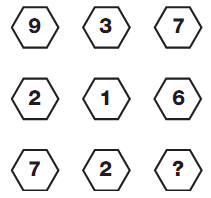
Identify whether the following sequence is a geometric sequence or not.
$$25,5,1,\dfrac{1}{5}$$
The fourth term of a G.P. is 8 and the 7th term is 64, find the G.P.
Find the mean of 43, 51, 50, 57 and 54.
Find the sum of the following series:
$$ 0.6+0.66+0.666+...$$ to n terms.
Increased by 3
The sum of the following series to infinity $$\displaystyle \frac{1}{1.3.5} +\frac{1}{3.5.7} +\frac{1}{5.7.9} +\,...\,\infty is $$ $$\dfrac{1}{3c}$$ .Find $$c$$
The sum of the series $$\displaystyle \frac2{3!}+\frac4{5!}+\frac6 {7!}+...$$ to $$\infty$$ = $$\displaystyle \frac{a}{e}$$. Find $$(a+3)^2$$.
If $$A_{n}= (n, n + 1)$$ then $$10(A_{10}A_{11})^{2}+11(A_{11}+A_{12})^{2}+......+20(A_{20}A_{21})^{2}$$ is equal to
Sum of the series $$\displaystyle 1+\left ( 1+2 \right )+\left ( 1+2+3 \right )+\left ( 1+2+3+4 \right )+... $$ to n terms be $$\displaystyle \frac{1}{m}n\left ( n+1 \right )\left [ \frac{2n+1}{k}+1 \right ]$$ .Find the value of k+m.
Considre the sequence $$\displaystyle \left ( a_{n} \right )n\geq 0 $$ given by the following relation:$$\displaystyle a_{0}=4,a_{1}=22,$$ and for all $$\displaystyle n\geq 2,$$ $$\displaystyle a_{n}=6a_{n-1}-a_{n-2}.$$ Prove that there exist sequences of positive integers $$\displaystyle \left ( x_{n} \right )n\geq 0,\left ( y_{n} \right )n\geq 0 $$ such that$$\displaystyle a_{n}=\frac{y^{2}_{n}+7}{x_{n}-y_{n}},$$ for all $$\displaystyle n\geq 0.$$
If the set natural numbers, is partitioned into subsets $$\displaystyle S_{1}= \left \{ 1 \right \},S_{2}= \left \{ 4,5,6 \right \},S_{4}= \left \{ 7,8,9,10 \right \}$$ The last terms of these groups is $$1,1+2,1+2+3,1+2+3+4 .....$$. Find the sum of the elements in the subset $$S_{50}$$.
sum the series $$1+2+...…….+100$$
sum of the series is $$1+3+6+10+15+... $$ to n terms $$\displaystyle \frac{n\left ( n+m \right )\left ( n+p \right )}{k}$$.Find $$k-m-p$$ ?
Sum of the series $$4+6+9+13+18+...$$ to $$n$$ terms be $$\displaystyle =\frac{n}{k}\left ( n^{2}+3n+m \right )$$.Find $$m-k$$ ?
Find the sum of 2n terms of the series $$\displaystyle 5^{3}+4.6^{3}+7^{3}+7^{3}+4.8^{3}+9^{3}+4.10^{3}+....$$
If $$\displaystyle s_{n}=1+\frac{1}{2}+\frac{1}{3}+\frac{1}{4}+...\frac{1}{n},\left ( n\: \epsilon \: N \right )$$, then $$\displaystyle s_{1}+s_{2}+s_{3}+s_{4}+...s_{n}=\left ( n+\lambda \right )s_{n+1}-\left ( n+1 \right )$$. Find the value of $$\displaystyle \lambda $$
Find the sum to $$n$$ terms of the sequence $$8, 88, 888, 8888, ....$$ .
If $$a,b,c$$ and $$d$$ are in $$G.P.$$ show that $$\displaystyle ({ a }^{ 2 }+{ b }^{ 2 }+{ c }^{ 2 })({ b }^{ 2 }+{ c }^{ 2 }+{ d }^{ 2 })={ (ab+bc+cd) }^{ 2 }$$.
If $${S}_{n}={(4)}^{n}+3$$, what is the units digit of $${S}_{100}$$?
Rahul's father wants to deposit some amount of money every year on the day of Rahul's birthday. On his $$1st$$ birth day $$Rs.100$$, on his $$2nd$$ birth day $$Rs.300$$, on his $$3rd$$ birth day $$Rs.600$$, on his $$4th$$ birthday $$Rs.1000$$ and so on. What is the amount deposited by his father on Rahul's $$15th$$ birthday.
The product of two numbers is $$119$$ and their AM is $$12$$. Find the numbers.
Find $$x$$, if the given numbers are in A.P. $$5$$, $$(x - 1)$$, $$0$$
Find the last digit of $$1^5 + 2^5 + ..... + 99^5$$.
The following geometric arrays suggest a sequence of numbers.
(a) Find the next two terms.
(b) Find the $$100^{th}$$ term.
(c) Find the $$n^{th}$$ term.

Find the sum of all the digits of the result of the subtraction $$10^{99} - 99$$.
The sum of the first $$n$$ terms of a sequence is $$\dfrac {7^{n} - 6^{n}}{6^{n}}$$, Find its $$n^{th}$$ term. Determine whether the sequence is A.P. or G.P
Find the sum to infinite terms of the series
$$\dfrac {7}{5} \left (1 + \dfrac {1}{10^{2}} + \dfrac {1.3}{1.2} \cdot \dfrac {1}{10^{4}} + \dfrac {1.3.5}{1.2.3} \cdot \dfrac {1}{10^{6}} + ......\right )$$
If the sum of the first $$n$$ natural numbers is $${S}_{1}$$ and that of their squares is $${S}_{2}$$ and cubes is $${S}_{3}$$, then show that $$9{ S }_{ 2 }^{ 2 }={ S }_{ 3 }(1+8{ S }_{ 1 })$$.
The sum of first $$n$$ terms of a sequence is $$\cfrac { { 6 }^{ n }-{ 5 }^{ n } }{ { 5 }^{ n } } $$
Find its $$n^{th}$$ term and examine whether the sequence is an A.P of G.P.
Find the sum of the series $$1\cdot 2+2\cdot 3+3\cdot 4+\cdots +n\left( n+1 \right) $$.
Find the $${ n }^{ th }$$ convergent to $$\dfrac { 6 }{ 5- } \dfrac { 6 }{ 5- } \dfrac { 6 }{ 5- } \cdots $$.
If n is a multiple of $$6$$, show that each of the series $$\displaystyle n-\frac{n(n-1)(n-2)}{\left\lfloor 3\right.}\cdot 3+\frac{n(n-1)(n-2)(n-3)(n-4)}{\left\lfloor 5\right.}\cdot 3^2-.....,$$ $$\displaystyle n-\frac{n(n-1)(n-2)}{\left\lfloor 3\right.}\cdot \frac{1}{3}+\frac{n(n-1)(n-2)(n-3)(n-4)}{\left\lfloor 5\right.}\cdot\frac{1}{3^2}-.....,$$ is equal to zero.
The $$4^{th}$$ term of a geometric sequence is $$\dfrac {2}{3}$$ and the seventh term is $$\dfrac {16}{81}$$. Find the geometric sequence
Express $$\sqrt{19}$$ as a continued fraction, and find a series of fractions approximating to its value.
Show that $$1+\dfrac { 1 }{ 3\cdot { 2 }^{ 2 } } +\dfrac { 1 }{{ 2 }^{ 4 } } +\dfrac { 1 }{ 7.{ 2 }^{ 6 } } +....=\log _{ e }{ 3 } $$.
If $${ u }_{ 1 }=\dfrac { a }{ b } ,{ u }_{ 2 }=\dfrac { b }{ a+b } ,{ u }_{ 3 }=\dfrac { a+b }{ a+2b } ,\cdots $$, each successive fraction being formed by taking the denominator and the sum of the numerator and denominator of the preceding fraction for its numerator and denominator respectively, show that $${ u }_{ \infty }=\dfrac { \sqrt { 5 } -1 }{ 2 } $$.
If $$a=\underset{55}{\underbrace{111.........1}}, b=1+10+10^2+10^3+10^4$$ and $$c=1+10^5+10^{10}+....+10^{50}$$, then show following.
(i) 'a' is a not composite number
(ii) $$a\ is\ not\ equal\ bc$$
If $$ \sum_{r=0}^{n} \dfrac { (-1)^r \cdot C_r}{(r+1)(r+2)(r+3) } = \dfrac {1}{a(n+b) } , $$ then $$a+b$$ is :
Study the pattern:
$$91 \times 11 \times 1 = 1001 $$
$$91 \times 11 \times 2 = 2002 $$
$$91 \times 11 \times 3 = 3003$$
Write next seven steps. Check, whether the result is correct.
Try the pattern for $$143 \times 7 \times 1, 143 \times 7 \times 2 .....$$
How would we multiply the numbers 13680347, 35702369 and 25692359 with 9 mentally ? What is the pattern that emerges.
The sum of the series $$\displaystyle 1+\frac{1.3}{6}+\frac{1.3.5}{6.8}+....\infty$$ is?
If $$n\epsilon N$$ and $$n$$ is even, then $$\dfrac {1}{1.(n - 1)!} + \dfrac {1}{3!(n - 3)!} + \dfrac {1}{5!(n - 5)!} + .... + \dfrac {1}{(n - 1)!1!}$$ equals.
Solve the following equations.
$$\displaystyle\, 7^{x + 2} - \frac{1}{7}\cdot 7^{x + 1} - 14.7^{x - 1} + 2.7^x = 49$$
If $$f\left( x+y,\ x-y \right) =xy$$, then the arithmetic mean of $$f(x,y)$$ and $$f(y,x)$$ is
If $$\alpha =\dfrac { 5 }{ 2!3 } +\dfrac { 5.7 }{ 3!{ 3 }^{ 2 } } +\dfrac { 5.7.9 }{ 4!{ 3 }^{ 3 } }$$,.... then find the value of $${ \alpha }^{ 2 }+4\alpha$$.
Prove $$1+2+3+4+5+\cdots+n=\dfrac{n(n+1)}{2}$$
Find the $$n^{th}$$ term and the sum of first $$n$$ terms of the sequence $$0.3$$, $$0.33$$, $$0.333$$,$$0.3333$$,.....
Find the sum of the series $${1}^{2}+({1}^{2}+{2}^{2})+({1}^{2}+{2}^{2}+{3}^{2})+.....$$
$$1 \, + \, \dfrac{3}{2} \, + \, \dfrac{5}{4} \, + \, \dfrac{7}{8} \, + \, ..... \, n \, terms$$
The natural numbers are written in the form of a triangle as shown below :
The sum of numbers in all the n rows .
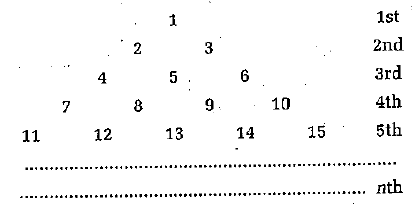
The sum of 'n' terms of series $$\bigg(1-\dfrac{1}{n}\bigg)+\bigg(1-\dfrac{2}{n}\bigg)+\bigg(1-\dfrac{3}{n}\bigg)+...........$$ will be
There are $$n$$ AM's between $$1\,\& 31$$ such that $$7th$$ mean: $${\left( {n - 1} \right)^{th}}$$ mean $$ = 5:9,$$ then find the value of $$n.$$
If $$\displaystyle x=\sum _{ n=0 }^{ \infty }{ { a }^{ n } } ,y=\sum _{ n=0 }^{ \infty }{ { b }^{ n } } ,z=\sum _{ n=0 }^{ \infty }{ { \left( ab \right) }^{ n } } $$,
where $$a,b<1$$ then prove that $$xz+yz=xy+z$$.
Another form:
For $$0<\theta ,\phi -\cfrac { \pi }{ 2 }$$ if $$\displaystyle x=\sum _{ n=0 }^{ \infty }{ \cos ^{ 2n }{ \theta } }$$
$$\displaystyle y=\sum _{ n=0 }^{ \infty }{ \sin ^{ 2n }{ \phi } , } z=\sum _{ n=0 }^{ \infty }{ \cos ^{ 2n }{ \theta } } \sin ^{ 2n }{ \phi }$$ then prove that $$xz+yz-z=xy$$.
If a , b are = ive , then from any integer n prove that
$$(a \, + \, b)^n \, < \, 2^n\, (a^n \, + \, b^n )$$
Find the $$50_{th}$$ term of the sequence:
$$\dfrac{1}{n},\,\dfrac{n+1}{n},\,\dfrac{2n+1}{n}...................$$
(a) If the roots of the equation, $$(b-c){ x }^{ 2 }+(c-a)x+(a-b)=0$$ be equal, then prove thar a,b,c are in arithmetical progression.
(b) If $$a(b-c){ x }^{ 2 }+b(c-a)x+c(a-b)=0$$ has equal roots, prove that a,b,c are in harmonical progression.
If y = x$$^n$$ log x then
$$ y_n \, = \, n!\left [ log \, \, x \, + \, 1 \, +\dfrac{1}{2}\, +\dfrac{1}{3} .... \, + \, \, \dfrac{1}{n} \right ]$$
$$\forall \, n \, \epsilon \, N$$ and x > 0.
A sequence of real numbers $$a_1, a_2,$$___ $$a_n$$ is such that $$a_1=0, |a_2|=|a_1+1|, |a_3|=|a_2+1|$$, _______$$|a_n|=|a_{n-1}+1|$$. Show that A.M. of these numbers is always greater or equal to $$-1/2$$.
Show that $$\dfrac{1}{a_1a_2}+\dfrac{1}{a_2a_3}+$$________$$+\dfrac{1}{a_{n-1}a_n}=\dfrac{n-1}{a_1a_n}$$.
What is the expression of $$\tan^3x$$?
Find the arithmetic mean
If $$69.5$$ is the mean of $$72, 70, x, 62, 50, 71, 90, 64, 58$$ and $$82$$. Find the value of $$x.$$
Sum upto $$n$$ the series
$$6+66+666+.....$$
Observe the following pattern:$$2^{6} = 64$$
$$2^{5} = 32$$
$$2^{4}=16$$
$$2^{3} =8$$
$$2^{2} =4$$
$$2^{1} =?$$
$$2^{0} =?$$
You can guess the value of $$2^{0}$$ by just studying the pattern!
You find that $$2^{0}$$ =1
If you start from $$3^{6} = 729$$, and proceed as shown above finding $$3^{5},3^{4},3^{3}...$$ etc, what will be $$3^{0}$$ = ?
Find the number of terms in the series $$20 + 19 \dfrac{1}{3} + 18 \dfrac{2}{3} + ....$$ of which the sum is $$300$$, explain the double answer.
$$2+2+4+1+8+\dfrac{1}{2}+16+......+55$$ term sum =?
Find the sum of series $$1+(2)(3)+(4)+(5)(6)+7+....$$ upto $$50$$ term.
Find the smallest among three consecutive odd natural numbers whose sum is $$87.$$
Find the sum of series
$$0.5 + 0.55 + 0.555 + ...$$
The sum of $$10^2+11^2+12^2+....+20^2$$ is
A plant doubled its height each yer until it reached its maximum height over the course of $$12$$ years How many years did it take for it to reach half of its maximum height?
If $$a, b, c$$ be the respective sums of the $$n$$ terms, next $$n$$ terms and of G.P. then prove that $$a, b, c$$ are in G.P.
If $$\displaystyle \sum _{r=1}^{n}{T_{r}=5n+2}$$ and $$\displaystyle \sum _{r=1}^{n}{T_{r}^{2}=an^{3}+bn^{2}+cn+d}$$ then the value of $$d+b+c$$
Find the next term $$3, 5, 7, 10, 11, 15, 15, 20,$$__
$$\left( 1+\dfrac { 3 }{ 1 } \right) \left( 1+\dfrac { 5 }{ 4 } \right) \left( 1+\dfrac { 7 }{ 9 } \right) ...\left( 1+\dfrac { \left( 2x+1 \right) }{ { n }^{ 2 } } \right) ={ \left( n+1 \right) }^{ 2 }.$$
Prove $$\left( 1+\dfrac { 1 }{ 1 } \right) \left( 1+\dfrac { 1 }{ 2 } \right) \left( 1+\dfrac { 1 }{ 3 } \right) ...\left( 1+\dfrac { 1 }{ { n } } \right) ={ \left( n+1 \right) }.$$
The arithmetic mean of the nine numbers in the given set $${\left\{9, 99, 999, 999999999 \right\}}$$ is a $$9$$ digit numbers $$N$$, all whose digits are distinct. The number $$N$$ does not contain the digit
$$\dfrac{1}{{1.2.3}} + \dfrac{1}{{2.3.4}} + \dfrac{1}{{3.4.5}} + .... + \dfrac{1}{{m\left( {n + 1} \right)\left( {n + 2} \right)}} = \dfrac{{n\left( {n + 3} \right)}}{{4\left( {n + 1} \right)\left( {n + 2} \right)}}$$
Sum the series :
$$2^{1/4} \, \cdot \, 4^{1/8} \, \cdot \, 8^{1/16} \, \cdot \, 16^{1/32} \, ....$$ is equal
Let $$a_1, a_2, a_3, a_4, a_5$$ be a G.P. of positive real numbers such that the A.M. of $$a_2$$ and $$a_4$$ is $$117$$ and the G.M. of $$a_2$$ and $$a_4$$ is $$108$$. Then the A.M. of $$a_1$$ and $$a_5$$ is:
In the given squences 2,5,6.....50and 3,5,7.....60
How many terms are common to both?
A series of numbers is given as $$1, \dfrac{1}{2}, -4, 4, \dfrac{1}{8}, -16, ......$$ The next number in the series is
Find the sum of place value of last 3 places in the sum of first '10' terms of : 4 + 44 + 444 + ...
Find the value of $$\lim\limits_{n \to \infty}\dfrac{1}{n}\displaystyle \sum^{n}_{r=1}\sin^2 \dfrac{r\pi}{n}$$.
Sum: $$\frac{3}{1^2.2^2}+\frac{5}{2^2.3^2}+\frac{7}{3^2.4^2}+.......$$ to n terms.
Vijay is planting trees. He has enough trees to plant $$6, 7$$ or $$14$$ trees in each row. What is the least number of trees Vijay could have?
$$1+3+5+.........+2n-1=$$
Find the $$n^{th}$$ term and sum to $$n$$ terms of the following series:
$$2 + 6 + 12 + 20 +$$____
If the roots of $$x^{3}+px^{2}+qx+r=0$$ are in G.P., find the relation between $$p,q,r$$.
Find the $$n^{th}$$ term and sum to $$n$$ terms of the following series:
$$3 + 6 + 11 + 18 +$$____
The value of $$\sum_\limits{i=1}^n\sum_\limits{j=1}^i\sum_\limits{k=1}^j 1=$$
$$cos \{\frac{2\pi}{2^{64}-1}\}cos\{\frac{2^2\pi}{2^{64}-1}\}......cos\{\frac{2^{64}\pi}{2^{64}-1}\}=$$
find the sum : $$tan x tan 2x + tan2x tan 3x + .............+ tan nx tan(n+1)x $$.
If statement $$P(n)$$ is $$"3n + 1 $$ is even". Then verify that statement $$P(1)$$ is true but $$P(2)$$ is not true.
$$7, 13, 19,...., 205$$.
Prove that $$\dfrac{(2n!)}{n!}=2^n (1.3.5....(2n-1))$$.
Find the $$n^{th}$$ term and sum to $$n$$ terms of the following series:
$$1 + 9 + 24 + 46 + 75 +$$_____
Find the period of $$f\left( x \right) =\tan { \left( x+4x+9x+.......+{ n }^{ 2 }x \right) } $$
Prove that $${ 2 }^{ 1/4 }\cdot { 4 }^{ 1/8 }\cdot { 8 }^{ 1/16 }\cdot { 16 }^{ 1/32 }\cdot ........\cdot \infty =2$$
$$1+2+3+....+n < \dfrac{1}{8} (2n+1)^2$$.
$$5+3+2=151022$$
$$9+2+4=183652$$
$$8+6+3=482466$$
$$5+4+5=202541$$
Then . . .
$$7+2+5= ?????$$
Find the total number of ways in which six $$'+'$$ and four $$'-'$$ signs can be arranged in a line such that no two $$'-'$$ signs occur together.
Find the sum to the first n terms of the series :
$$\frac{1}{{(1 - x)(1 - {x^3})}} + \frac{{{x^2}}}{{(1 - {x^3})(1 - {x^5})}} + \frac{{{x^4}}}{{(1 - {x^5})(1 - {x^7})}} + ...,x \ne 1, - 1,0$$
Find the $${8^{th}}$$ term of the sequence whose first three terms are $$ 3,\, 3,\, 6$$ and each term after the second is the sum of three two terms preceding it .
Solve: $$\cfrac{1}{2}+\cfrac{1}{6}+\cfrac{1}{12}+\cfrac{1}{20}+.....+\cfrac{1}{1892}+\cfrac{1}{1980}=$$?
If $$a, b, c , d$$ are in G.P., show that
i) $$a^2 + b^2 , \, b^2 + c^2, \, c^2 + d^2$$ are in G.P
Find m if the following equation holds true: $$ 1.2 + 4.3 + 9.4 + ... n^2 (n + 1) = \dfrac{n}{m} (n + 1) (n + 2) (3n + 1)$$
If $$\frac{1}{{1!9!}} + \frac{1}{{3!7!}} + \frac{1}{{5!5!}} + \frac{1}{{9!1!}} = \frac{{{2^n}}}{{10!}}$$
Then $$n = $$
In a sequence of $$21$$ terms, the first $$11$$ term are in $$A.P$$ with common difference $$2$$ and the last $$11$$ terms are in $$G.P.$$ with common ratio $$2$$. If the middle term of the $$A.P.$$ is equal to the middle term of $$G.P.$$ The find the middle term of the entire sequence.
Find $$n^{th} $$ term of the series$$3\times 1^{2} , 5\times 2^{2} , 7\times 3^{2} , .....$$
Prove : $${1^2} + \left( {{1^2} + {2^2}} \right) + \left( {{1^2} + {2^2} + {3^2}} \right) + \ldots $$ upto $$n$$ terms $$ = \dfrac{{n{{\left( {n + 1} \right)}^2}\left( {n + 2} \right)}}{{12}}$$
$$1^2+\left(\dfrac{3}{2}\right)^2+2^2+\left(\dfrac{5}{2}\right)^2+...$$ to $$40$$ terms.
Find the average of first $$40$$ natural numbers?
Find the sum to n terms of the series
$$ 05+11+19+29+$$......?
Find the sum of the series $$\displaystyle\sum^n_{r=1}r\times r!$$
If sum to infinity of the series $$3-5r+7r^2-9r^3+....$$ is $$\dfrac{14}{9}$$, find r.
A snail starts moving towards a point $$3$$cm away at a pace of $$1$$cm per hour. As it gets tired, it covers only half the distance compared to previous hour in each succeeding hour. In how much time will the snail reach his target?
Find the $$nth$$ term and the sum of $$n$$ terms of the series $$1.2.4+2.3.5+3.4.6+....$$
The sum of the nth term of the series 1.2.5 + 2.3.6 + 3.4.7 + .....n terms is
Find the sum of $$5+7+9+11+13+....$$ for $$50$$ terms.
If the roots of the equation $$x^3-12x^2+39x-28=0$$ are in A.P., then their common difference will be,
Find the sum of the given series $$6+11+16+21+......+86$$
Find:$$1^3-2^3+3^3-4^3+.....+9^3=?$$
Sum to $$infinite$$ terms the following series:
$$1 + 4x + 7x^{2} + 10x^{3} + ..., |x| < 1$$.
Sum to $$n$$ terms the following series:
$$1 + 2x + 3x^{2} + 4x^{3} + ...,|x| < 1$$
Sum to $$n$$ terms of the following series:
$$1+\left(1+\dfrac{1}{2}\right) + \left(1 + \dfrac{1}{2} + \dfrac{1}{4}\right) + ,...$$
Sum to $$n$$ terms the series :
$$1 \times 2+2\times 3+3\times 4+4\times 5+..$$
Let $$d$$ be the minimum value of $$f(x)=5x^2-2x+\dfrac{26}{5}$$ and $$f(x)$$ is symmetric about $$x=r$$. If $$\sum_{n=1}^{\infty}(1+(n-1)d)r^{n-1}$$ equals $$\dfrac{p}{q}$$, where $$p$$ and $$q$$ are relative prime, then find the value of $$(3q-p)$$.
Sum to $$n$$ terms the series :
$$1\times 3+3\times 5+5\times 7+7\times 9+..$$
A binary string of length $$N$$ is a sequence of $$0s$$ and $$1s$$. For example, $$01010$$ is a binary string of length $$5$$. For a string $$A$$ we write $$A_{i}$$ to refer to the letter at the $$i^{th}$$ position.
Find missing.....

Find the sum of 1st n terms of the series 5+7+13+85+.
If sum to infinity of series $$3-5r+7r^{2}-9r{3}+.$$ is $$14/9$$, find $$r$$.
If a,b,c are positive real numbers in A.P and $${a^2},{b^2},{c^2}$$ are in H.P, then$$\dfrac{a}{b} + \dfrac{b}{c} + \dfrac{c}{a} = $$
If $$a,b,c$$ are in $$A.P$$, then show that $$10^{ax+10},10^{bx+10},10^{cx+10},x \neq 0$$ are in $$G.P$$
Sum of the series $$4+6+9+13+18+......n$$ terms , is
Find the $${10^{th}}$$ form of the series $$3 + 6 + 12 + ....$$
The sum of the series $$1 + \frac{1}{6} + \frac{1}{{18}} + \frac{7}{{324}} + ....\infty ,$$ is
Find the average of first $$20$$ multiples of $$7$$
$${\alpha _r},{\beta _r}({\alpha _r} < {\beta _r})\;{\text{are}}\;{\text{the}}\;{\text{root}}\;{\text{of}}\;{x^2} - {r^2}\left( {r + 1} \right)x + {r^5} = 0$$ Find the value of $$\sum\limits_{r = 1}^n {\left( {3{\alpha _r} + 2{\beta _r}} \right): - } $$
Find the sum to $$n$$ terms of the series, whose $$n$$th term is given by $${n}^{2}+{2}^{n}$$.
$$2\cdot 3+3\cdot 4+4\cdot 5+.....$$ upto $$n$$ terms Find sum of $$n$$ of series.
$${1^3} - {2^3} + {3^3} - {4^3} + .... + {9^3} = $$
Solve $$1 - \dfrac { 1 } { 2 } + \dfrac { 1 } { 3 } - \dfrac { 1 } { 4 } + \dots \infty $$
Find n if the sum of the first n terms of the series $$\sqrt{3}+\sqrt{75}+\sqrt{243}+\sqrt{507}+......is435\sqrt{3}$$.
Show that $$\left( 1 + 2 x + 3 x ^ { 2 } + 4 x ^ { 3 } + \ldots \ldots . \infty \right) ^ { 3 / 2 } = 1 + 3 x + 6 x ^ { 2 } + 10 x ^ { 3 } + \ldots \ldots , \infty ,$$ where $$| x | < 1$$
The sum of series $$\frac{1}{3\times 6}+\frac{1}{6\times 9}+\frac{1}{9\times 12}+$$...... is:
The traffic lights at three different road crossing change after every 48 seconds, 72 seconds and 108 seconds respectively.If they change simultaneously at 7 : 00 a.m, at what time will they change simultaneously again?
satisfies the recurrence relation $$b_{n+1}=\frac{1}{3}\left ( 2b_{n}+\frac{125}{b^{2}_{n}} \right ),b_{n}\neq 0$$
$$\sqrt{1+3+5+7+...}$$.
As income is $$10\%$$ more than that of B. How much per cent is the income of B less than that of A?
An Arithmetic Series is defined as
$$f\left( n \right) = a + \left( {n - 1} \right)d,n \in N,$$ prove that A.M. of $$f\left( 1 \right)$$ and $$f\left( {2n - 1} \right)$$ is $$f\left( n \right)$$.
What comes next in the series?
$$2,3,6,10,17,28,?$$
Find the co-efficient of $$x ^ { 7 }$$ in the series of $$e ^ { 2 x }$$.
Show that : $$\dfrac{1^3}{1} + \dfrac{1^3 + 2^3}{1+3} + \dfrac{1^3 + 2^3 + 3^3}{1+3+5}$$ .........up to n terms = $$\dfrac{n}{24}[2n^2 +9n +13]$$
Find the sum of $$8 + 88 + 888 + 8888 + \cdots$$
Solve
$$1^{3}+\dfrac{1^{3}+2^{3}}{2}+\dfrac{1^{3}+2^{3}+3^{3}}{3}+...$$
Find the $$A.M$$. of the series $$1, 2, 4, 8, 16, .......2^{n}$$
Find the sum to infinity of the series $$1 + \dfrac { 2 } { 3 } + \dfrac { 6 } { 3 ^ { 2 } } + \dfrac { 10 } { 3 ^ { 3 } } + \dfrac { 14 } { 3 ^ { 4 } } + \ldots$$
Evaluate $$\sum _ { k = 1 } ^ { n } \left( 2 ^ { k } + 3 ^ { k - 1 } \right)$$
$$\frac { 1 } { 1 \times 2 } + \frac { 1 } { 2 \times 3 } + \frac { 1 } { 3 \times 4 } + \ldots$$ what will be the $$n^{th}$$ term?
Sum to infinite terms of
$$1 + 3 x + 5 x ^ { 2 } + 7 x ^ { 3 } + \ldots \ldots + \infty ( \boldsymbol { H } \boldsymbol { f } | x | < 1 )$$ is
Write the next term of each of the following sequences :
$$0, 2, 6, 12, 20,.....$$
The formula of the sum of first $$n$$ natural numbers is $$S = \frac { n ( n + 1 ) } { 2 }$$. If the sum of first $$n$$ natural number is $$325$$, find $$n$$.
The decimal expansion of the rational number $$\dfrac{43}{2^{4}\times 5^{3}}$$ will terminate after how many places of decimal.
Find the sum of the series : $$\dfrac{1}{3^{2}+1}+\dfrac{1}{4^{2}+2}+\dfrac{1}{5^{2}+3}+\dfrac{1}{6^{2}+4}+...\infty$$
Write the next term of each of the following sequences :
$$6, 9, 16, 27, 42,.....$$
Can you find the missing numbers?
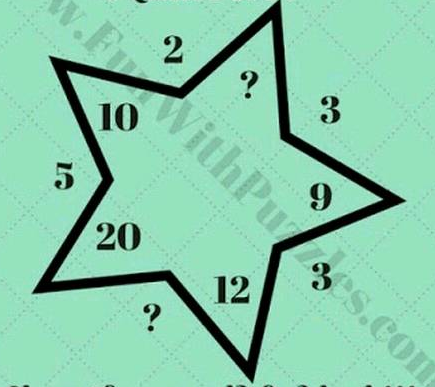
Find the sum of first $$1000$$ natural numbers and first $$1000$$ non-positive integers.
Complete the addition and subtraction box.
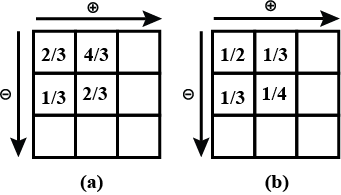
Evaluate:$$1 \dfrac { 1 } { 2 } + 1 \dfrac { 1 } { 3 } + 1 \frac { 1 } { 4 } + \ldots + 1 \dfrac { 1 } { 19 } =$$
Assume that $$a,b,c$$ and $$d$$are positive integers such that $$a^{5}=b^{4},c^3=d^{2}$$ and $$c-a=19$$. Determine $$d-b$$
$$1+2x+3x^2+4x^3+.....\infty; |x| < 1$$.
Prove that
$${1}^{2}+{3}^{2}+{5}^{2}+...+{\left(2n-1\right)}^{2}=\dfrac{n}{3}\left(2n-1\right)\left(2n+1\right)$$
Find the value of $$\dfrac{50}{72}+\dfrac{50}{90}+\dfrac{50}{110}+\dfrac{50}{132}+...+\dfrac{50}{9900}$$.
$$\dfrac{a}{1+i}+\dfrac{a}{(1+i)^{2}}\dfrac{a}{(1+i)^{3}}+....+\dfrac{a}{(1+i)^{n}}$$
In the four numbers first three are in G.P. and last three are in A.P. whose common difference isIf the first and last numbers are same, then first will be
What will be in the '?' mark
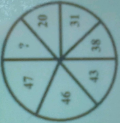
Prove that $${ 3 }^{ \frac { 1 }{ 2 } }\times { 3 }^{ \frac { 1 }{ 4 } }\times { 3 }^{ \frac { 1 }{ 8 } }.....=3$$
Given that $$\left( 1 + x + x ^ { 2 } \right) ^ { n } = a _ { 0 } + a _ { 1 } x + a _ { 2 } x ^ { 2 } + \ldots + a _ { 2 n } x ^ { 2 n } ,$$ find the values of
(i) $$a _ { 0 } + a _ { 1 } + a _ { 2 } + \dots . + a _ { 2 n }$$
(ii) $$a _ { 0 } - a _ { 1 } + a _ { 2 } - a _ { 3 } \dots . . + a _ { 2 n }$$
What is the $${1025}^{th} $$ term of the sequence $$1,2,2,4,4,4,4,8,8,8,8,8,8,8,8,?$$
Find the sum of first $$n$$ terms of the series $${1^2} + \left( {{1^2} + {2^2}} \right) + \left( {{1^2} + {2^2} + {3^2}} \right) + .....$$
Write the seventh term of the series $$\dfrac{1}{\sqrt{2}}, -2, \dfrac{8}{\sqrt{2}},\dots \dots$$
Solve:$$2\dfrac {1}{5}+3\dfrac {1}{7}$$
Find the sum of $$1+4+7+10+.......$$ to $$22$$ terms.
Find the mean weight from the following table.
| Weight $$(kg)$$ | $$29$$ | $$30$$ | $$31$$ | $$32$$ | $$33$$ |
| No.of children | $$20$$ | $$01$$ | $$04$$ | $$03$$ | $$05$$ |
How many terms of the geometric progression $$1+4+16+64+..........$$ must be added to get sum equal to $$5641$$?
Find the value of $$y$$ if $$1+4+7+10+.....+y=287$$
Prove that $$\dfrac{1}{1+\sqrt{2}}+\dfrac{1}{\sqrt{2}+\sqrt{3}}+\dfrac{1}{\sqrt{3}+\sqrt{4}}+ ............. +\dfrac{1}{\sqrt{8}+\sqrt{9}}$$=2
If a boy bats 100 times and gets 40 hits, what is his batting average ?
Fill this square using all numbers from 21 to 29.

look at the pattern and Solve
1 = 1X1
121 =__x__
12321 =__x__
1234321=__x__
_____ =11111x11111
If the mean of $$5$$ observations $$x,x+2,x+4,x+6$$ and $$x+8$$ is $$11$$, find the value of $$x$$.
In a question, 55+10 = 20 and 45+40 = 49, then 95+70 = ?
Calculate the arithmetic mean, range, median and mode of the given data:$$2,\,4,\,7,\,4,\,9,\,5,\,7,\,3,\,6,\,7$$
Fill in the blanks in the expressions with the proper numbers.
$$(1\ \times 7)=(\Box \times 1)$$
Find the mean been the following:-
$$2,2,0,4,3,9,5,7$$
$$x=7$$ when $$y=5$$. Find $$y$$ when $$x=14$$.
if $$1 + {x^2} = \sqrt 3 x,\,\,then,\,\,\prod\limits_{n = 1}^{24} {\left( {{x^n} + \dfrac{1}{{{x^n}}}} \right)} $$ is equal to:
Which month has the maximum number of birthdays?_____________
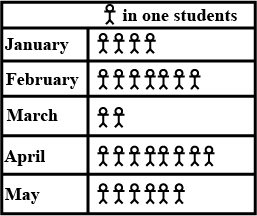
Find the mean of the following.
First seven multiples of $$6$$
Find the mean of the following
First eight even natural numbers.
If $${S_n}$$ denotes the sum of $$n$$ terms of an AP whose common differences is $$d$$, show that $$d = {S_n} - 2{S_{n - 1}} + {S_{n - 2}}$$
The mean of $$12,65,84,75,a$$ is $$50$$ Find a
The value of p if ,the mean of $$23,25,p$$ is 24
Find the missing number:$$ \begin{array}{|c|c|c|}\hline 5 & {6} & {12} \\ \hline 4 & {3} & {4} \\ \hline 2 & {3} & {?} \\ \hline 18 & {27} & {96} \\ \hline\end{array} $$
Observe the given pattern
$$4\times 0+1=01$$
$$4\times 1+2=06$$
$$4\times 2+3=11$$
$$4\times3+4 =16$$ and find the $${15}^{th}$$ term.
If the mean of $$x+4,5,3,6,7$$ is 5 then find x
Solve:
$$\frac{1}{{2.5}} + \frac{1}{{5.8}} + \frac{1}{{8.11}} + - - - + \frac{1}{{(3n - 1)(3n + 2)}}$$
A student scored marks 46 % in English, 67 % in Maths, 53 % in Hindi, 72 % in History and 58 % in Economics. As compared to other subject weightage given to Mathematics, then find weightage mean marks of students.
Four terms are in $$A.P.$$ If sum of numbers is $$50$$ and largest number is four times the smaller one, then find the terms.
Find the sum of the series $$\displaystyle \frac { 1 }{ 1.2 } -\frac { 1 }{ 2.3 } +\frac { 1 }{ 3.4 } -.....\infty $$
Simplify : $$15\times \left( -25 \right) \times \left( -4 \right) \times \left( -10 \right) $$
$$1^{3}+2^{3}+3^{3}+.....+n^{3}$$
The fourth term of a G.P. is 27 and the 7th term is 729, find the G.P.
The seventh term of a G.P. is 8 times the fourth term and 5th term isFind the G.P.
Find AM of $$12$$ and $$14$$.
Find AM of $$15$$ and $$-13$$.
Find the sum of the series whose nth term is :
$$n^{3}-3^{n}$$
Find AM of $$7$$ and $$27$$.
Find the sum of the series whose nth term is:
$$n(n+1)(n+4)$$
Find the arithmetic mean between $$9$$ and $$19$$.
Find the sum of the series whose nth term is:
$$(2n-1)^{2}$$
Find the sum of the series whose nth term is:
$$2n^{3}+3n^{2}-1$$
Find the sum of the following series to n terms:
$$1.2.4+2.3.7+3.4.10+...$$
Find the $$20^{th}$$ term and the sum of 20 terms of the series : $$2\times 4+4\times 6+6\times 8+...$$
An insect is on $$0$$ point of a number line, hopping towards $$1$$. She covers half the distance from her current location to $$1$$ with each hop. So, she will be at $$1/2$$ after one hop, $$3/4$$ after two hops, and so on.
Where will the insect be after $$n$$ hops?

Which of the following form of an A.P.? Justify your answer.
-1, -1, -1, -1, .......
Justify whether it is true to say that $$-1, \dfrac{-3}{2}, -2, \dfrac{5}{2}, .....$$ forms an A.P. as $$a_2-a_1= a_3-a_2$$.
The time taken by Rohan in five different races to run a distance of 500 m was 3.20 minutes, 3.37 minutes, 3.29 minutes, 3.17 minutes and 3.32 minutes. Find the average time taken by him in the races.
Find the arithmetic mean between $$15$$ and $$-7$$.
Find the arithmetic mean between $$-16$$ and $$-8$$.
Find the geometric progression whose $$4^{\text {th }}$$ term is 54 and the $$7^{\text {th }}$$ term is 1458.
In which of the following situations do the list of numbers involved form an A.P.?
Give reasons for your answers.
The number of bacteria in a certain food item after each second, when they double in every second.
Let $$S$$ denote sum of the series $$\dfrac{3}{2^3} + \dfrac{4}{2^3} + \dfrac{5}{2^3} + \dfrac{6}{2^5} + ... \infty$$. Then the value of $$S^{-1}$$ is.
The sum of first $$n$$ natural numbers is given by
$$\cfrac { 1 }{ 2 } {n}^{2}+\cfrac { 1 }{ 2 } n$$. Find
The sum of first $$5$$ natural numbers
Fourth and seventh terms of a G.P. are $$ \dfrac{1}{18} $$ and $$ \dfrac{-1}{486} $$ respectively. Find the G.P.
Define\space geometric progression.
If $$n$$ arithmetic mean are inserted in between $$1$$ and $$51$$ such that ratio of $$4th$$ and $$7th$$ arithmetic mean is $$3:5$$ then find the value of $$n$$.
Find the G.P. $$ \dfrac{1}{27} , \dfrac{1}{9} , \dfrac{1}{3} $$ , ............. $$81$$ ; find the product of fourth term from the beginning and the fourth term from the end.
Simplify $$1+\dfrac{1}{3}.\dfrac{1}{4}+\dfrac{1.4}{3.6}.\dfrac{1}{4^2}+...$$
Find the arithmetic mean of:
$$(m + n)^2$$ and $$(m n)^2$$
Write the formula to find arithmetic mean of $$3$$ numbers
Find the arithmetic mean of:
$$3x 2y$$ and $$3x + 2y$$
Find the arithmetic mean of:
$$-5$$ and $$41$$
the mean $$\bar{x}$$
Prove that :
$$\sqrt{2}=1+\dfrac{1}{2^2}+\dfrac{1.3}{2! . 2^4}+\dfrac{1.3.5}{3! . 2^6}+...$$
Simplify $$1+\dfrac{1}{10}+\dfrac{1.4}{10.20}+\dfrac{1.4.7}{10.20.30}+...$$
Prove that:
$$\dfrac{5\sqrt{2}}{7}=1+\dfrac{1}{10^2}+\dfrac{1.3}{1.2}\dfrac{1}{10^4}+...$$
$$1+\dfrac{1}{4}+\dfrac{1.4}{4.8}+\dfrac{1.4.7}{4.8.12}+...$$
Simplify $$1-\dfrac{1}{2}.\dfrac{1}{2}+\dfrac{1.3}{2.4}\bigg(\dfrac{1}{2}\bigg)^2-\dfrac{1.3.5}{2.4.6}\bigg(\dfrac{1}{2}\bigg)^3+...$$
Prove that:
$$\bigg(\dfrac{3}{2}\bigg)^{1/3}=1+\dfrac{1}{3^2}+\dfrac{1.4}{1.2}.\dfrac{1}{3^4}+\dfrac{1.4.7}{1.2.3}.\dfrac{1}{3^6}+...$$
Prove that:
$$(1+x)^n=2^n\Bigg[1-\dfrac{n(1-x)}{(1+x)}+\dfrac{n(n+1)}{2!}\Bigg(\dfrac{1-x}{1+x}\Bigg)^2-\,...\Bigg]$$
Evaluate $$S=1+\dfrac{4}{5}+\dfrac{7}{5^2}+\dfrac{10}{5^3}+......$$ to infinite terms. Find $$16S$$
Find the sum of $$n$$ terms of $${ 1 }^{ 2 }+\left( { 1 }^{ 2 }+{ 2 }^{ 2 } \right) +\left( { 1 }^{ 2 }+{ 2 }^{ 2 }+{ 3 }^{ 2 } \right) +\left( { 1 }^{ 2 }+{ 2 }^{ 2 }+{ 3 }^{ 2 }+{ 4 }^{ 2 } \right) +...$$ from that find the sum of the first $$10$$ terms
What is the value of ($${2^2+ 4^2+ 6^2 +... + 20^2}$$)-($${1^2 + 3^2 + 5^2+ ... + 19^2}$$)?
Show that the $$3{ n }^{ th }$$ convergent to
$$\dfrac { 1 }{ 5- } \dfrac { 1 }{ 2- } \dfrac { 1 }{ 1- } \dfrac { 1 }{ 5- } \dfrac { 1 }{ 2- } \dfrac { 1 }{ 1- } \dfrac { 1 }{ 5- } \cdots $$ is $$\dfrac { n }{ 3n+1 } $$.
Find the sum of $$\displaystyle\frac{1}{(1+x)(1+ax)}+\frac{a}{(1+ax)(1+a^2x)}+\frac{a^2}{(1+a^2x)(1+a^3x)}+....$$ to $$n$$ terms.
If $$x=a+\displaystyle\frac{1}{b+}\frac{1}{b+}\frac{1}{a+}\frac{1}{a+}....,$$$$y=b+\displaystyle \frac{1}{a+}\frac{1}{a+}\frac{1}{b+}\frac{1}{b+}....,$$.Then show that $$(ab^2+a+b)x-(a^2b+a+b)y=a^2-b^2$$.
Then show that $$(ab^2+a+b)x-(a^2b+a+b)y=a^2-b^2$$.
Sum the following series to n terms and to infinity $$\displaystyle\frac{1}{1.2}+\frac{1}{2.3}+\frac{1}{3.4}+....$$.
Prove that $$ \cos^3 \theta + \cos^3 \left( \theta - \dfrac {2 \pi}{n} \right) + \cos^3 \left( \theta - \dfrac {4 \pi}{n} \right) + ... $$ to $$n$$ terms $$ = 0 $$
Find Sum of Series $$ \tan^2 x \tan 2x + \dfrac {1}{2} \tan^2 2x \tan 4x + \dfrac {1}{2^2} 4x \tan 8x + ....$$ to $$n$$ terms.
Find the sum to infinite terms of the series $$\dfrac {x}{1 - x^{2}} + \dfrac {x^{2}}{1 - x^{4}} + \dfrac {x^{4}}{1 - x^{8}} + .....$$
Find the sum of the following infinite series:
$$\displaystyle\sum _{ n=0 }^{ \infty }{ \cfrac { 1 }{ n! } \left[ \sum _{ k=0 }^{ n }{ \left( k+1 \right) \int _{ 0 }^{ 1 }{ { 2 }^{ -\left( k+1 \right) x }dx } } \right] }$$
Find $$ \ \sin\theta+\ \sin({\pi}+\theta) +\ \sin(2\pi+\theta) +\ \sin(3\pi+\theta)+ \cdots $$ upto $$2021$$ terms.
What is value of
$$1 + x + {x^2} + {x^3} + {x^4} + .....$$
where $$x \ne 1$$
1.3+3.5+5.7+....+$$\left( {2n - 1} \right)\left( {2n + 1} \right) = \frac{{n\left( {4{n^2} + 6n - 1} \right)}}{3}$$
$$\cos { \dfrac { x }{ 2 } } \times \cos { \dfrac { x }{ { 2 }^{ 2 } } } \times \cos { \dfrac { x }{ { 2 }^{ 3 } } } ..........\times \cos { \dfrac { x }{ { 2 }^{ n } } }$$$$A\rightarrow \infty$$$$\dfrac { \sin { { 2 }^{ n } } A }{ { 2 }^{ n }\sin { A } }$$
If $$S=\frac{1}{1^2}+\frac{1}{2^2}+\frac{1}{3^2}+\frac{1}{4^2}+.............$$ to$$ \infty$$ then find $$\frac{1}{1^2}+\frac{1}{3^2}+\frac{1}{5^2}+\frac{1}{7^2}+.............$$ to$$ \infty$$ in terms of S.
Find the sum of infinite terms of following series.
$$\dfrac{3}{7}+\dfrac{5}{21}+\dfrac{7}{63}+\dfrac{9}{189}+$$.....
Sum of infinity the following series:
$$1 + 4x^{2} + 7x^{4} + 10x^{6} + ..., |x| < 1$$.
Find the sum to the series $$1.n+2(n-1)+3(n-2)+...+n.1$$
Sum to $$infinite$$ terms the following series:
$$1 + 5x^{2} + 9x^{4} + 13x^{6} + ...., |x| < 1$$
If $$S_n = \dfrac{3}{4} + \dfrac{5}{36} + \dfrac{7}{144} + \dfrac{9}{400} +...$$ to $$n$$ terms, then find $$\dfrac{1}{1 - S_{40}}$$.
Sum the following series
$$\dfrac{1}{1.4.7}+\dfrac{1}{4.7.10}+\dfrac{1}{7.10.13}+....$$ to $$n$$ terms
Sum to $$infinite$$ terms the following series:
$$1 + 3x + 5x^{2} + 7x^{3} + ...., |x| < 1$$.
In the given diagram the circle stands for "educated", square for "lazy", triangle for "urban" and the rectangle for "honest" people. The different regions in the diagram are numbered from $$2$$ to $$13$$. Number $$4$$ will show which of the case?
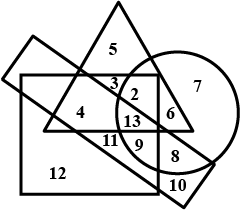
If $$\left| x \right| < 1$$ and $$\left| y \right| < 1$$, find the sum to infinity to the series
$$\left( {x + y} \right) + \left( {{x^2} + xy + y} \right)$$ + $$\left( {{x^3} + {x^2}y + x{y^2} + {y^2}} \right)$$
If $$a,\ b,\ c$$ are in $$A.P.$$ and $$P$$ is the $$A.M.$$ between $$a$$ and $$b$$, and $$q$$ is the $$A.M.$$ between $$b$$ and $$c$$, show that $$b$$ is the $$A.M.$$ between $$p$$ and $$q$$.
Let $$x = 111 .... 11$$ ($$20$$ digits)
$$y = 333 .... 33$$ ($$10$$ digits)
and $$z = 222 .... 22$$ ($$10$$ digits),
The value of $$\dfrac{x - y^2}{z}$$.
Show that $$\cfrac { 1.2 ^{ 2 }+{ 3 }^{ 2 }+...+n }{ { 1 }^{ 2 }. 2+{ 2 }^{ 2 }. 3+...+ n } =\cfrac { 3n+5 }{ 3n+1 } $$
If $${\left(1+x-2{x}^{2}\right)}^{20}=\sum_{r=0}^{40}{{a}_{r}{x}^{r}}$$ then the value of $${a}_{1}+{a}_{3}+{a}_{5}+...+{a}_{39}$$
What is the ninth term of the sequence whose general term $$a_{n}=(-1)^{n-1}n^{3}$$.
The sum of the infinite series $$\dfrac { 1.3 } { 2 } + \dfrac { 3.5 } { 2 ^ { 2 } } + \dfrac { 5.7 } { 2 ^ { 3 } } + \dfrac { 7.9 } { 2 ^ { 4 } } + \ldots . . . . . . . \infty.$$
If $$\dfrac{{a}^{n}+{b}^{n}}{{a}^{n-1}+{b}^{n-1}}$$ is the A.M. between $$a$$ and $$b$$, then find the value of $$n$$
Find the sum of the series
$$\dfrac{3 \cdot 5}{5 \cdot 10} + \dfrac{3 \cdot 5 \cdot 7}{5 \cdot 10 \cdot 15} + \dfrac{3 \cdot 5 \cdot 7 \cdot 9}{ 5 \cdot 10 \cdot 15 \cdot 20} + ..... \infty$$.
The average of two numbers 'a' and 'b' is 68 and the average of 'b' 'c' is 70 and that and 'c' isFind the values of a, b, c.
Find the mean of first five prime numbers.
The sum of the series $$\dfrac{1}{1 ! (n-1) ! }+\dfrac{1}{ 3! (n-3) !}+\dfrac{1}{5 ! (n-5)!}+.......+\dfrac{1}{(n-1) ! 1!}$$
Class 11 Engineering Maths Extra Questions
- Binomial Theorem Extra Questions
- Complex Numbers And Quadratic Equations Extra Questions
- Conic Sections Extra Questions
- Introduction To Three Dimensional Geometry Extra Questions
- Limits And Derivatives Extra Questions
- Linear Inequalities Extra Questions
- Mathematical Reasoning Extra Questions
- Permutations And Combinations Extra Questions
- Principle Of Mathematical Induction Extra Questions
- Probability Extra Questions
- Relations And Functions Extra Questions
- Sequences And Series Extra Questions
- Sets Extra Questions
- Statistics Extra Questions
- Straight Lines Extra Questions
- Trigonometric Functions Extra Questions
